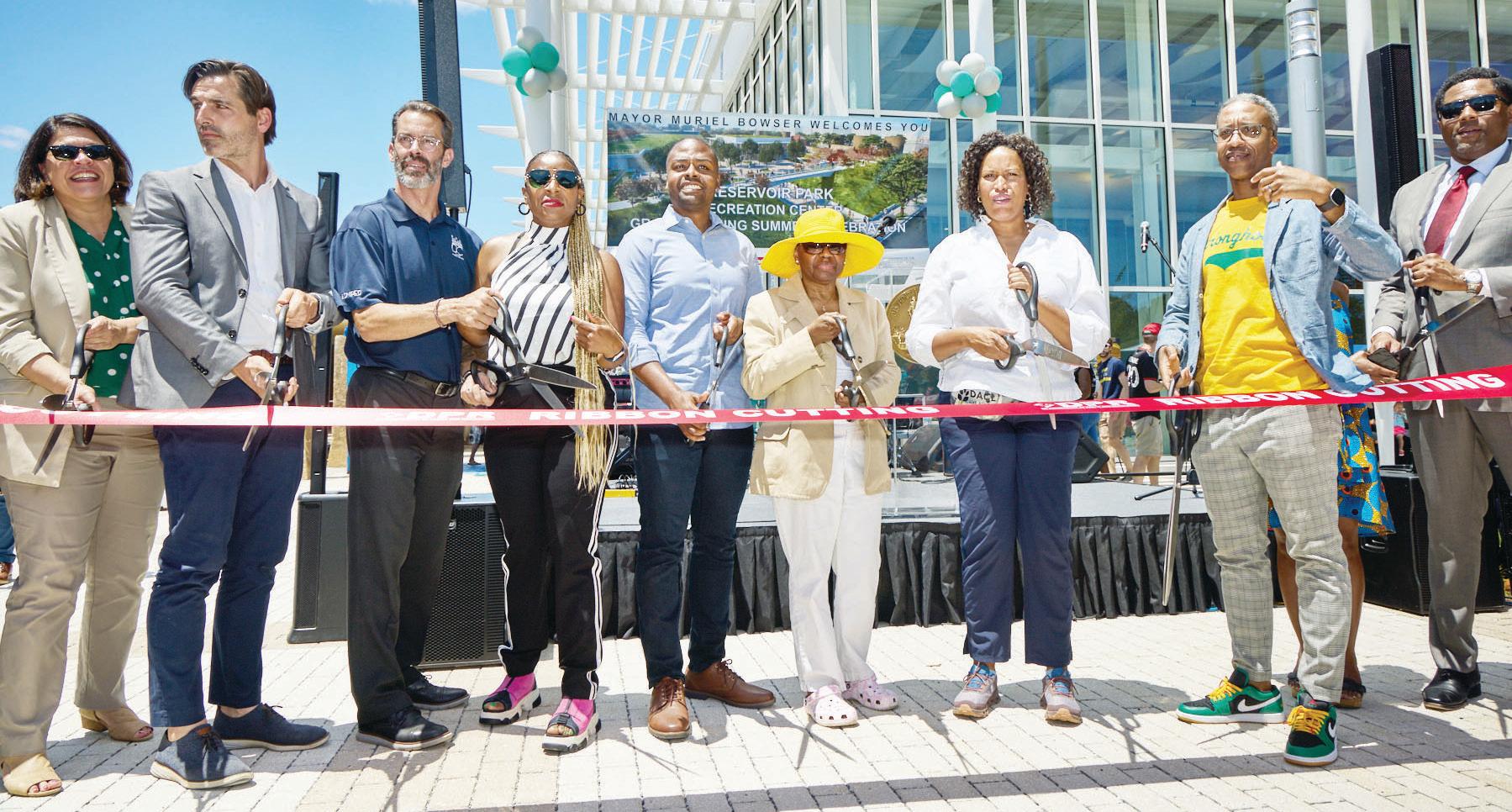










Dear Fellow Publishers and Guests,
The paragraphs below appeared in the March 9, 1940 edition of the AFRO:
Publishers Form New Association
“A three-day meeting of publishers representing twenty-one newspapers, called by John Sengstacke, general manager of the Chicago Defender, resulted Saturday in the formation of a permanent organization to be known as the Negro Newspaper Publishers’ Association.
The Conference, held at the Wabash Avenue YMCA, was devoted to problems affecting the colored press. Thursday the program concerned editorial policy. Discussions and talks on advertising constituted Friday’s agenda, with Saturday devoted to building business and formation of a permanent organization. The group took time out from opening sessions to pay tribute to the memory of Robert S. Abbott, editor of the Defender, who died a few hours before the conference began.
In addition to naming Sengstacke president of the newly formed association, other officers elected at the concluding session were Thomas Young, Norfolk Journal and Guide, selected as secretary-treasurer; D. Arnett Murphy, of Baltimore AFRO-AMERICAN, was chosen to serve as vice president of the Eastern District; Frank Stanley, of the Louisville Defender, was asked to oversee the Southern District; Jacob Tipper, of the Chicago World, was appointed to the Midwestern District, and C.A. Franklin, of the Kansas City Call, was given control of the Western District. The group also adopted a resolution favoring the formation of a nonprofit news gathering organization controlled by the publishers.”
Today, more than 200 Black-owned newspapers (print and digital) are proud members of NNPA, which is planning to commemorate the Bicentennial of Freedom’s Journal, the Nation’s first Black newspaper in 2027.
This year, the AFRO is thrilled to welcome the NNPA back to Baltimore for its annual
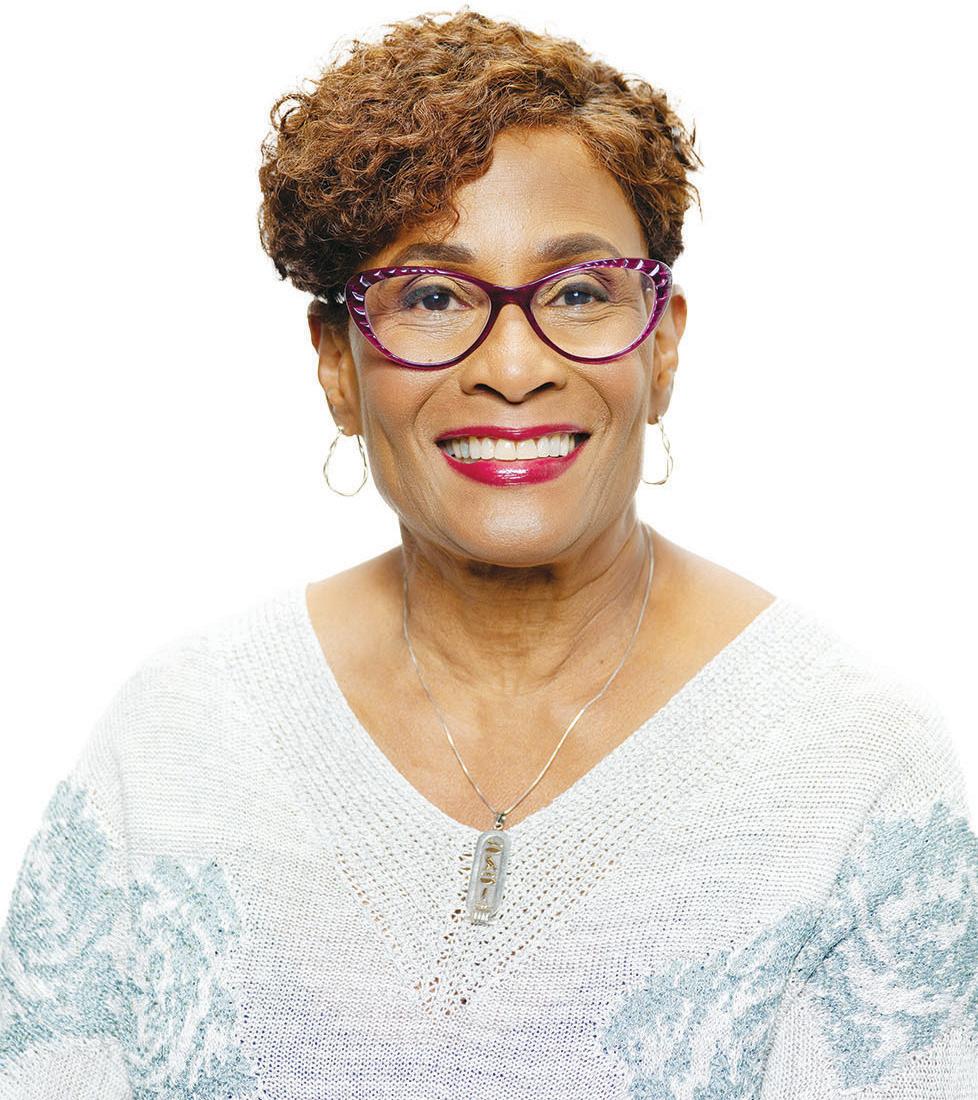
Courtesy photo
Dr. Frances “Toni” Murphy Draper serves as publisher of the AFRO American Newspapers (AFRO News), a publication founded by her great-grandfather, John Henry Murphy Sr., in 1892.
convention. This is not, however, our first time hosting our innovative peers, generous sponsors, and accomplished program participants. Baltimore hosted NNPA in 1953, 1972, 1982, and 1992.
Interestingly, in 1953, when the convention was held at Morgan State College (now University), at the invitation of Morgan President Dr. Martin Jenkins and my grandfather AFRO Publisher, Carl J. Murphy, we were not able to stay in every downtown hotel in Baltimore. A few years later, when reporting on the selection of Kansas City as the choice for NNPA’s June 1925 convention, an AFRO reporter wrote: “Unlike Baltimore, Maryland, all of this city’s downtown hotels welcomed guests as the NNPA began its threeday convention here. Forty-two delegates representing 18 newspapers were registered at the opening session of the 17th annual meeting.”
Today, we are welcomed and courted by every hotel in Baltimore, a predominantly Black city with strong Black leaders all the way through the state level. Our standout elected officials include Congressman Kweisi

Mfume (D-Md.-07), Gov. Wes Moore (DMd.), Speaker of the Maryland House of Delegates Adrienne Jones (D-Md.-10), Prince George’s County Executive and presumptive democratic nominee for the U.S. Senate, Angela Alsobrooks, and Mayor Brandon M.
“The convention planning committee, under the leadership of NNPA Chair Bobby Henry, and the seasoned guidance of NNPA President and CEO Dr. Benjamin F. Chavis and NNPA Executive Administrator Claudette Perry, have been hard at work ensuring that your stay is both informative, enjoyable and most of all stress-free.”
Scott – just to name a few.
Our convention venue, The Four Seasons Hotel, located in Harbor East is a beautiful waterfront property where the owners have promised to do everything possible to make our stay enjoyable and comfortable. While in
Harbor East, I hope you’ll take time to stop by BLK Swan, a Black-owned restaurant that is only a three to five minute walk from the hotel or the many other shops and restaurants in the area. The convention planning committee, under the leadership of NNPA Chair Bobby Henry, and the seasoned guidance of NNPA President and CEO Dr. Benjamin F. Chavis and NNPA Executive Administrator Claudette Perry, have been hard at work ensuring that your stay is both informative, enjoyable and most of all stress-free.
I’m also grateful to co-hosts Joy Bramble and Paris Brown of the Baltimore Times and NNPA Treasurer Cheryl Smith, publisher-editor Messenger Media. It was, as our chair is fond of saying, a team effort!
Baltimore has so much to offer, and cannot be defined by fictional television shows or biased reporting that only tells part of our story. Thank you NNPA and the Black Press of America for keeping journalism honest and telling the complete story of our history, our accomplishments, our strengths and our struggles.
Welcome to Charm City!
Warm regards, Dr. Frances “Toni” Murphy Draper First Vice Chair, NNPA 2024 Convention Co-Host CEO and Publisher, AFRO American Newspapers
A trusted voice: Preserving the future of the Black PressBy Megan Sayles AFRO Business Writer msayles@afro.com
Fears over the future of the newspaper industry are not new. With the transition to the internet in the 1990s, the rise of social media in the 2000s and the emergence of artificial intelligence, media organizations have had to continually adapt.
As consumption patterns change, advertising revenue slows and media consolidation takes place, some organizations may perceive more obstacles than opportunities. However, Benjamin Chavis, president and CEO of the National Newspaper Publishers Association (NNPA), has the opposite outlook.
“All businesses have challenges and opportunities,” said Chavis. “The question is, are the opportunities greater than the challenges? That answer is ‘yes.’”
The opportunities at hand rest in news organizations’ ability to deliver content through a multitude of mediums, which Chavis thinks has expanded the business model.
“Black Press is still in the print business, but it’s expanded to digital and social media. A lot of our businesses are multimedia companies now,” said Chavis. “Some people think one media form supplants the other, but that’s not accurate. We’re content producers and distributors. It’s a matter of how we distribute content, and we do that in multiple formats and channels.”
Bobby R. Henry Sr., chairman of the NNPA and publisher of the Westside Gazette, thinks there’s also a certain amount of grit that sustains the business of the Black Press.
His father, Levi Henry Jr., started the family paper more than 50 years ago in Fort Lauderdale, Fla. after being misquoted by one of the local White-owned papers, which refused to retract or correct

Courtesy photo Benjamin Chavis is the CEO and president of the National Newspaper Publishers Association (NNPA). The trade organization represents more than 200 Black newspapers across the country.
the quote. Its early motto was “a positive paper for a positive people.”
Growing up at the paper and then leading it, Henry Sr. remembers encountering many trials and tribulations.
“I vividly remember the struggles, the sleepless night and not being able to pay the printer. All of that comes to
“The future of the Black Press and the future of Black America are inextricably linked.”
mind,” said Henry Sr. “When I’m asked about a business model, it’s to grind by any means necessary.”
Henry Sr. noted that social media and recent initiatives to secure the future of news have created additional avenues for gaining revenue. But, for him, the true power is in the content the Black Press disseminates.
“The core of gaining the revenue is the same. It’s the
message that we’re putting out and the voices that we’re speaking for,” said Henry Sr. “Though we try to engage on all fonts, that doesn’t mean anything if we don’t have the pulse of the people.”
Chavis shared this perspective. He said the Black Press has earned its position as the trusted voice of the Black community. This distinction underpins the value of Black media.
“It adds value to everything that we do, everything that we publish and everything that we distribute,” said Chavis. “Potential sponsors and advertisers get a greater return on investment when they do business with the Black Press because we’re the trusted voice.”
In the face of attacks on Black history and diversity, equity and inclusion, both Henry Sr. and Chavis think safeguarding the future of the Black Press is of vital importance. For Henry Sr., it’s even a matter of life and death, and it’s going to take a team effort to achieve.
He thinks the Black community cannot win the battle alone. The team must include people from allied communities, but they must be chosen carefully.
Chavis noted that the protection of the Black Press is not just for the benefit of Black communities but for everyone. He compared it to Martin Luther King’s dream. While many think the renowned civil rights leader was only advocating for the rights of African Americans, Chavis said he was fighting for the liberation and self-determination of all Americans.
“The future of the Black Press and the future of Black America are inextricably linked. If the Black Press becomes silent, that will be injurious to the future of Black America,” said Chavis. “We serve as a vital source of information not only to Black America but to America in general.”
During the National Newspaper Publishers Association’s (NNPA) midwinter conference, held earlier this year in January, six new publishers were approved as members of the historic organization, often referred to as “The Black Press.”
The newest members of the NNPA, who will attend their first National Convention June 19 – 22 in Baltimore, and the publications they represent include: Dale Edwards, of the Cleveland American News, in Cleveland; David Mark Greaves, of Our Time Press, in Brooklyn; Cary Wheelous, of Hayti, in Durham, N.C.; Penda Howell, of the New Jersey Urban News, in Newark, N.J.; D. Etta Wilcoxon, publisher of The Renaissance Observer, in Detroit and James DuBose, publisher of In the Black Network, in Woodland Hills, Calif.
The Black Press and its legacy can be traced back to 1827, when Freedom’s Journal, America’s first Black-owned and operated periodical, began publication.
Others would soon follow in the footsteps of Samuel Cornish and John Brown Russwurm, the founders of Freedom’s Journal, including Philip Alexander Bell, who printed the Colored America from 1837 – 1841; Frederick Douglass, who printed the The North Star from 1847 – 1860, and Daniel Rudd, who published the Ohio Times, founded in 1885. Rudd later expanded into the American Catholic Tribune –
reportedly the first Black-owned national newspaper in America.
The NNPA, formerly the National Negro Publishers Association, was established in 1940 and took its current name in 1956. Since its founding, the NNPA has consistently served as the voice of the Black community and an incubator for news that makes history and impacts the country.
Dr. Benjamin F. Chavis Jr., president and CEO of the NNPA and a civil rights icon in his own right, proudly touts the legacy of the NNPA.
“We have shown the nation the struggle, sacrifice, progress and triumph of Black Americans and of America as a nation from the Black perspective,” he said in a statement. “The Black Press covers the progress of Black Americans and provides interpretation of the events involved in our progress. No other print or digital media serves in this role quite like the Black Press.”
New Jersey publisher returns to his roots
Penda Howell, publisher of New Jersey Urban News, is no stranger to the Black Press. Howell formerly served as the director of advertising for the Amsterdam News, where he worked for 18 years before leaving in 2021 as the newspaper’s vice president and chief revenue officer. He remembers how he first began to shape what has evolved into New Jersey Urban News.
“In 2019, I was accepted as a Maynard 200 fellow in the entrepreneurial cohort and

Your History • Your Community • Your News
The Afro-American Newspapers
Baltimore Office • Corporate Headquarters
233 E. Redwood Street 6th Floor, Suite 600G Baltimore, Maryland 21202
410-554-8200 • Fax: 410-554-8213 afro.com
Founded by John Henry Murphy Sr., August 13, 1892
Chairman of the Board/Publisher - Frances Murphy Draper
(Publisher Emeritus - John J. Oliver Jr.)
President - Benjamin Murphy Phillips IV
VP of Marketing and Technology - Kevin E. Peck
Director Digital Solutions - Dana Peck
Receptionist - Wanda Pearson - 410-554-8200, ext. 246
Director of Operations
Andrè Draper - 410-554-8200
Director of Finance
Bonnie Deanes - 410-554-8242
Executive Director/Director of Advertising
Lenora Howze - 410-554-8271 - lhowze@afro.com
Director of Community & Public Relations
Diane W. Hocker - 410-554-8243
Editorial
Managing Editor - Alexis Taylor - 410-554-8257
Editor - Dorothy Boulware - 410-554-8231
Special Projects
Editorial Assistant - Ama Brown-Parson
Archivist - Savannah Wood- 410-554-8277
Baltimore Circulation/Distribution Manager
Andrè Draper - 410-554-8200
Production Department - 410-554-8200
Washington Office
1140 3rd Street, N.E., 2nd Floor Washington, D.C. 20002-6723
202-332-0080 • Fax: 410-554-8213
(Washington Publisher Emerita - Frances L. Murphy II)
Director of Operations - Andrè Draper - 410-554-8200
Customer Service, Home Delivery and Subscriptions: 410-554-8200

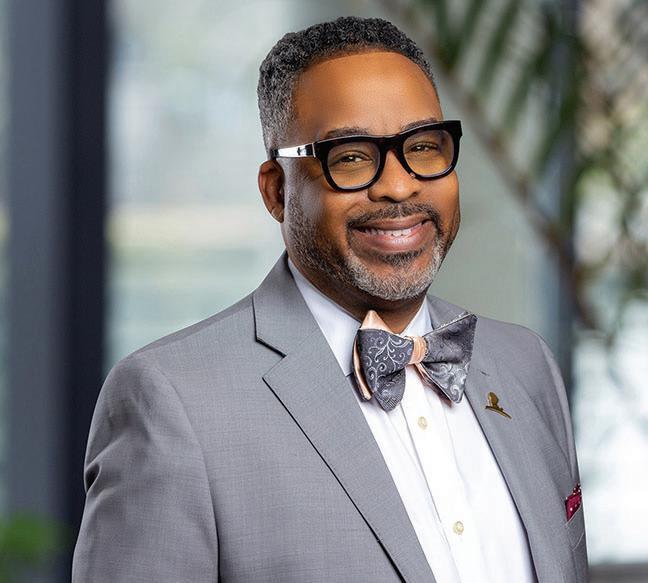
for my project, I was given the task to develop a concept that served a digital-only audience composed of readers who lived in a news desert,” said Howell. “In 2020, I formed the company and began playing around with different designs. The launch of New Jersey Urban News occurred the following year, in 2021, at which point it became a very personal, side project – one to which I was totally committed.”
Howell, a native of Paterson, N.J., currently resides in East Stroudsburg, Penn. with his wife Dorothy, CFO and COO of the publication. He said returning to
his roots, where Black voices and stories of Black achievements are routinely ignored, served as
project, but I soon realized that a platform which amplifies the voices of underrepresented communities in New Jersey was sorely needed – one which also addressed the lack of comprehensive communication and focused journalism in New Jersey’s Black communities,”
Howell said. “My goal, since our founding, has remained the same: to deliver inclusive, impactful news coverage that both informs and empowers our readers.”
Howell said without question, the Black Press and the message its publications disseminate are more relevant than ever before.
“Given the misinformation and polarization of information distributed by mainstream media, the relevance of the Black Press cannot be emphasized enough,” he said. “It’s vital that Black communities have news and information that can impact and edify their personal lives – information that assists
“Black communities rely on the Black Press because they know they can trust us – we deliver news that is unbiased and community focused.”
a motivation for establishing his digital-only publication.
“It may have started as a
readers to make better informed decisions for their families and themselves, and which encourages a commitment to
civic engagement.”
“Black communities rely on the Black Press because they know they can trust us – we deliver news that is unbiased and community focused,” continued Howell. “We are local news at its best.”
The New Jersey publisher, 55, said his decision to join the NNPA was an easy one.
“NNPA is in my blood and after 18 years of service, I recognize the importance and relevance of the Black Press,” he said. “I come from a general marketing media background and before joining the Amsterdam News, I was part of the North Jersey Media Group, which is now Gannett, where I was first exposed to the strengths of the Black Press.”
Howell spoke on how Black Press changed his life so many years ago.
“It was apparent, even then, that the news and information that Black publications provided was the kind that was relevant, resourceful and impactful to me both personally and professionally,” he said. “I wanted to be a cog in that chain – one which added to their capacity. Joining the NNPA was an easy decision because there’s no other media trade organization in America that does it better.”
You can read and support New Jersey Urban News by visiting their website, www. njurbannews.com.
Throughout its 84 years of existence, the National Newspaper Publishers Association (NNPA) has served as a pillar within the Black Press, allowing for generations of Black journalists to get their start. Many of the organizations within the NNPA are small but mighty publications that have been around long enough to watch journalism students turn into media moguls.
NNPA publications are known for being an environment that offers a warm introduction into the world of journalism, while also providing live opportunities to cover important issues in the Black community.
“I graduated from Florida
“If you talk to a lot of journalists who’ve gone on to great positions in this industry, you’ll see that a lot of them worked at the Black Press. That was invaluable to them. I think that we really should talk about that more.”
A&M University and my first job out of college was at the Daytona Times, where I’m the publisher,” said Jenise Griffin, publisher of the Daytona Times and the Florida Courier. “I
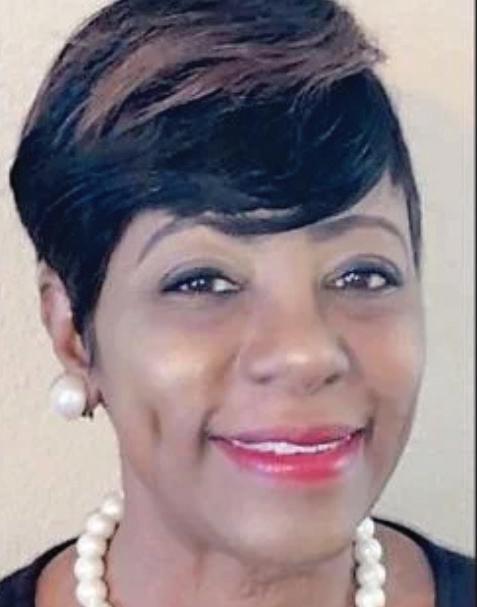
Jenise Griffin is publisher of the Daytona Times, where her career began after graduating from Florida A&M University. She is also publisher of the Florida Courier, a sister paper of the Daytona Times.
worked there for four years and I was able to do a lot more there than I would be able to do at a mainstream paper.”
Griffin previously worked at the Daytona Times early on in her career and she explained how much she values the experiences she had during her first few years as a journalist. Sharing that working for a Black publication helped hone her skills and prepare her for greater opportunities outside of the Daytona Times.
“I was able to get some really great reporting experience. I was able to move up and I learned about editing. I really honed my skills at the Daytona Times,” Griffin recalled. “When I left the paper I was the managing editor. I left there and went to the Orlando Sentinel and I became one of the first Black copy editors there.”
William Rhoden echoed Griffin’s sentiments, discussing how vital Black Press assignments can be for budding Black journalists.
“My first job was with the AFRO American Newspapers. Frances Murphy taught this journalism course at Morgan State where I was a student and I took her course,” said Rhoden, former AFRO staff and sports writer. “She told me that if I didn’t get drafted by an NFL
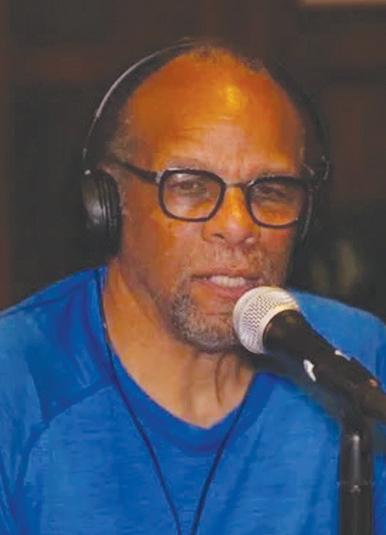
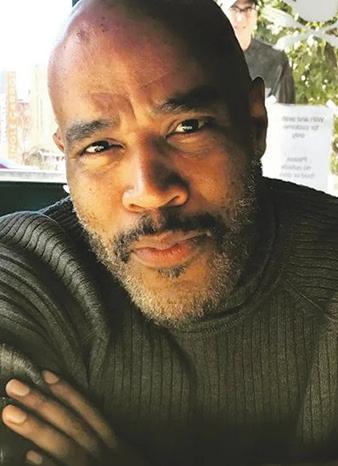
team and if I decided not to go to graduate school, then I was to bring my butt to the AFRO American Newspapers and start working.”
“I got my bachelor’s degree in journalism at the AFRO,” he says, fondly.
Following his time at the AFRO, Rhoden went on to work for a series of other well known publications like EBONY magazine and The New York Times. He credits his experience at the nearly 132 year old publication for teaching him the basics of journalism and establishing the foreground for his career.
“Although I left the Black Press after EBONY, I’ve always had the Black Press in my heart,” Rhoden stated. “I always represented the Black Press. Whether that be writing about Black people, issues that affect Black people or advocating for Black people through athletics.”
Like Rhoden, Griffin noted that service within the ranks of Black Press is indispensable.
“If you talk to a lot of journalists who’ve gone on to great positions in this industry, you’ll see that a lot of them worked at the Black Press,” shared Griffin. “That was invaluable to them. I think that we really should talk about that more.”
Former AFRO managing editor, Sean Yoes explained
how working for an NNPA publication provided him opportunities he wouldn’t have received at a White publication. He explained how these special opportunities are necessary to help amplify the voices of young, Black journalists.
“They gave me a chance. I was a young kid and I got thrown right into the fire,” Yoes recalled. “My first week at the AFRO I was on the front page. They took a chance with me because I didn’t know what I was doing. They guided me, they believed in me and I pulled it off–thank God.”
Yoes first began working for the AFRO in 1989 and throughout the years he returned to the publication taking on a series of roles. In between his time at the AFRO, he pursued other forms of media like acting, filmmaking and radio hosting. He noted that having a chance taken on him instilled a confidence in him that he’s carried with throughout his career.
“They gave me a platform when I was just a young kid. It was a trip to see my name in the newspaper, on the byline at age 23,” said Yoes. “I’ll always be thankful for that and in giving me that chance, it instilled confidence in me. That was the greatest gift they gave me– a chance.”

We must all stand before Christ to be judged. Everyone will get what they should. They will be paid for whatever they did—good or bad—when they lived in this earthly body. 2 Corinthians 5:10 (ERV)
As citizens of a democracy, our role in shaping its course cannot be overstated. Whether we cast our vote for President Joe Biden and the strides he has made for inclusion or Donald Trump for all that he has done and is doing to discredit this country as a democracy as a whole, our actions affect what happens in our country’s history. We better believe that our responsibility for our rights extends way beyond the ballot box; it includes the values we uphold, the causes we champion and the ideals we strive and will fight for.
No one man, woman or other should stand in the way of our freedom for equal rights and our will to be FREE-come hell or high water!
The actions of those who lead speak volumes about the direction in which we are headed. Whether we stand
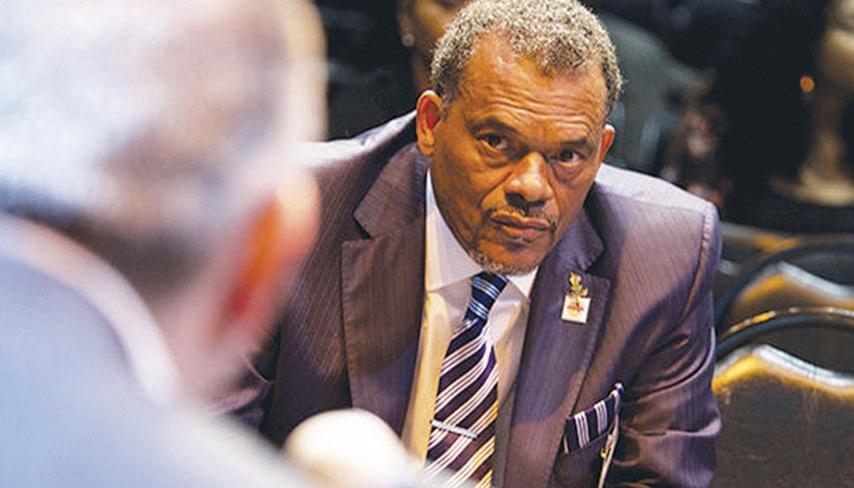
for women’s rights, Black Lives Matter, LGBTQ+ rights, diversity, equity, and inclusion (DEI), affirmative action, or combatting white supremacy, our choices shape the landscape of freedom, equality, and justice for all.
Supporting candidates who champion values essential for equity, it is not enough. We have to hold leaders accountable, demanding transparency, integrity, and loyalty to the principles upon which our democracy stands. We cannot afford to be passive observers, content with merely casting our votes and hoping for the best. We
must actively engage in our communities, standing up for the voices least heard, demanding change, and standing up against injustice wherever it may intrude.
The continuation of democracy depends on us and rests squarely on our shoulders. It is a collective endeavor, requiring the participation and dedication of every citizen who is willing not to fall for the bovine excretions. We must refuse complacency and apathy, recognizing that the fight for democracy is ongoing and requires our persistent concern.
Now is not the time for
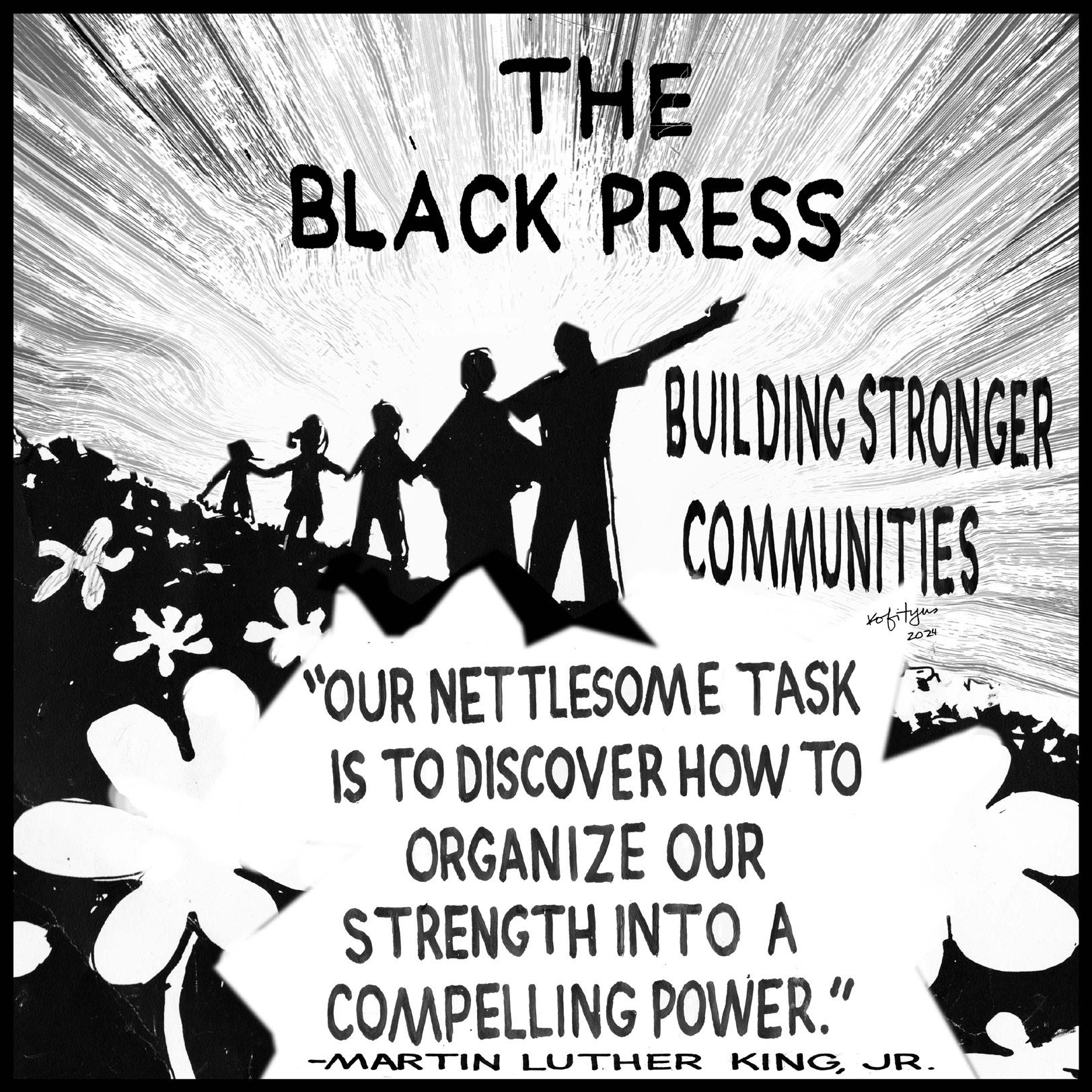
us to be divided or allow our lack of concern to see our democratic systems crumble right before our eyes. We have to know who is in the “foxhole” with us before we can conquer the
foes who are attempting to destroy us by keeping us apart. It is a time for unity and action. Regardless of our political affiliations, we must come together in defense of
our shared values and the principles that define us as a nation. Only then can we ensure that freedom, equality, and justice are not just lofty ideals, but tangible realities for all Americans.
Opinion: Gen-Z will save us all, that’s why they’re being censoredBy Sam Judy
As the TikTok Ban makes its way to the U.S. Senate, progressive organizations on college campuses advocating for Palestine are targets of a new resolution signed into law by Gov. Greg Abbott (R-Texas). Generation-Z, with higher rates of diversity, civic engagement and education, could be the spark that manifests a radical shift in U.S. politics. And that’s precisely why our current political leaders fear them.
One thing the United States government hates with a fiery, intense passion – more than terrorism, more than world hunger and more than homelessness – is a constituent educated to the unsavory aspects of Western culture and politics.
I don’t think this, I know this. How else could you explain legislation on a social media platform, primarily distinct as it’s become an oasis for progressive awakening and radicalization, advancing faster and with more bipartisan support than policies like marijuana legalization, universal healthcare, or divestment from foreign wars, that are well-received across the political spectrum?
Even as congressional action will progress slowly on this legislative initiative, it’s considered widely to be largely agreeable within the halls of the House and the Senate building. It’s like Nancy says, “Tic-tac-toe, a winner. A winner.” But unintelligible ramblings from someone’s grandmother aside, the
high-ranking Democrat and Ronald Reagan fan speaks subjectively on the TikTok ban when stating that this “is not an attempt to ban TikTok, it’s an attempt to make TikTok better.” Because what’s good for the US government is not always good for the people of this country.
So no, I don’t think it’s a coincidence that a platform mainly used by young Americans, who have either just entered the political sphere or are approaching it, is being treated as a potential digital center for propaganda because government entities can less effectively censor its content.
Aside from government rhetoric on TikTok holding racist undertones, a ban of the platform would be a hit directed against Generation-Z. Our current political leaders, many of whom have made careers on blocking critical and consequential legislation to appease lobbyists, hold an enormous fear for younger voters.
Younger voters, Gen-Z in particular, are less likely to go along with the status quo. They are less likely to follow the reasoning that the political establishment lays out for why our policies are so regressive compared to the rest of the world.
Whether this is related to the false depiction of universal healthcare as inefficient and ineffective, Nestle misleading consumers and lawmakers to prevent the establishment of federallyrequired paid maternity leave, or AIPAC’s normalization of
Zionism through infiltration of American politics, Gen-Z is not taking the bait. And distinctively, Gen-Z doesn’t seem to be going the way of the former hippies of the Baby Boom or the previously anti-establishment modern beatniks of Generation-X. In fact, they’re doubling down once they leave college.
In both Texas and the United States overall, as educational spaces are typically seen as a catalyst for political awakening, college campuses are similarly receiving a significant amount of scrutiny. Gov. Greg Abbott recently signed a bill into law cracking down on ‘anti-semitism’ on college campuses.
Students for Justice in Palestine at the University of Texas at Dallas have been particularly active in organizing spaces. Working closely with other national organizations like Palestinian Youth Movement and the Party for Socialism and Liberation to organize demonstrations advocating for the people of Palestine and condemning the actions of Israel, students are under threat of censorship from their university and even expulsion, as outlined by Abbott’s measure.
“By misrepresenting pro-Palestinian demands for justices, he tarnishes the reputation of Palestinian and pro-Palestinian activists while claiming to protect students’ rights,“ SJP of UTD said in a statement last month.
“[Abbott] is aware that student-led organizing for Palestinian freedom is a rapidly growing movement
across our connected Texas campuses, and he purposefully seeks to silence our voices.”
While UT Austin made headlines for sanctioning students for pro-Palestinian activism, schools in California and Tennessee have had students arrested following advocacy for the people of Gaza. This confirms that Texas is not an anomaly with its crackdown on ‘antisemitism.’
But ‘anti-semitism’ in this sense is simply a dog whistle for anti-Zionism. Ironically, the conflation of Judaism with Zionism shows parallels with the repurposing of the swastika as Nazi imagery from its previous context across Hindu, Buddhist, and Indigenous American faiths as a symbol of peace and prosperity.
Zionism, a bipartisan colonial and nationalist movement, is being more widely rejected by Gen-Z than any other age group. For many people, realizing antiZionist belief is a gateway to rejecting the colonial system overall. The United States, a colonial empire, does not like that.
The United States being a colonial empire is not an opinion. When you assess its actions across its 400year history, you’ll find commonalities in policy from the extermination and displacement of Indigenous and Black populations with current struggles in Puerto Rico, the Sudan, the Philippines, and the Democratic Republic of Congo.
My opinion though,
is that a largely peaceful demographic arguing for human rights to be censored by a government that profits from war, genocide, and displacement shows a troublingly-wide moral dichotomy that designates that peaceful demographic as being in a position of enormous power and purpose. The facet of generational change makes this political wave inevitable in its influence.
Gen-Z enters the political stage with more clarity and greater respect for scientific and liberal arts institutions rather than business and commerce and more regard for workers than CEOs, owners, and landlords. This, paired with authoritarian attitudes against criticism for the government and its allies, sets an inevitable civic confrontation if lawmakers fail to rein in Gen-Z’s political awakening and radicalism. Who knows, maybe Gen-Z will completely transform our political system
as they grow and develop as individuals in American society.
The U.S. House of Representatives just passed a resolution condemning the rallying cry “From the river to the sea, Palestine will be free” as an antisemitic phrase with a majority vote of 37744-1. With this, Congress continues to actively work against young pro-Palestinian activists by painting their support for liberation as a terroristic threat. As a pattern is beginning to take shape, we’re likely to see more and more legislation that imposes an authoritarian will on the people of the United States. Especially young activists hoping to make significant changes to the political system of this country. As far as the government sees it, the kids are not alright. But with a big brother like this, what’s the point of good behavior?
This article was originally published by NNPA Newswire.

Reaching voters is of utmost importance in an election year– even more so for Black communities throughout the U.S., who have dealt with voting disenfranchisement for more than a century.
While mainstream publications have slowly turned their tide, members of the Black Press have been agents of change by fostering conversations about inequalities facing the race at every turn and highlighting solutions for challenges impacting the lives of Black people.
“The Black Press has always played a pivotal role in our community, especially during election years,” said State Sen. Cory McCray (D-Md.-45). “It serves not only as a voice for the marginalized but also as a vigilant guardian, holding leaders accountable and ensuring that the pressing issues impacting our communities are brought to light.”
“During election years, their role becomes even more significant as they provide a space for informed discussions, highlight candidates’ positions on
key issues and ensure that the concerns of the Black community are addressed,” said McCray. “It highlights stories and perspectives that mainstream media often overlook, giving our community a sense of representation and ownership in the political process. Moreover, it plays a vital role in educating voters about the electoral process and the importance of their participation in shaping the future of our city and country.”
The Black Press has been key in using data and investigative journalism to publicize issues within the American voting system. In 2024, McKinney Gray, founder and CEO of the research and data analytics company McKinney Gray Analytics, revealed that about 25 million Black and Latino voters are not being reached and adequately informed about elections.
“According to my estimates, based on U.S. Census data and on a recent Stanford study, 24.76 million Black and Latino eligible voters are currently missing or listed with incorrect information in voter databases sold by vendors, making them effectively unreachable,” said Gray, in
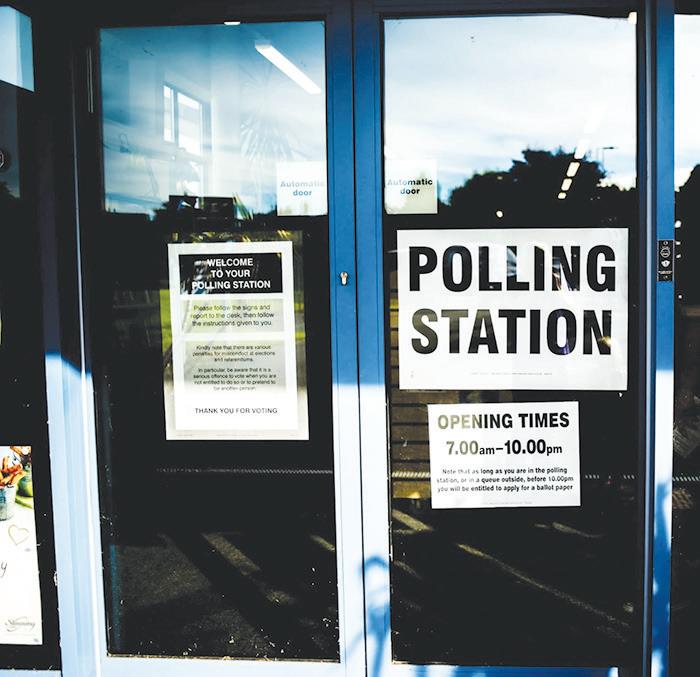
the executive summary of the report. “While 40 percent of Black and Latino people are invisible to voter outreach efforts, only 18 percent of White people are missing or mislisted.”
Members of the Black Press immediately came together to disseminate this information in efforts to make change as a way to encourage civic engagement and get as many souls to the polls as possible.
Still, some African Americans are simply not
In the courtroom: The influence ofBy Tashi McQueen AFRO Political Writer
tmcqueen@afro.com
Journalism aims to hold the government and leaders accountable and inform the public of what’s truly going on in their communities. Sometimes, this can result in changes in law and leadership.
In the mid-1950s, AFRO reporter Jimmy Hicks put on record the atrocities happening to young Black boys in the Deep South. His work covering the brutal murder of Emmett Till and the trial that followed, helped build sympathy for the plight of Black Americans– which ultimately built support for the Civil Rights Act of 1964.
“We owe a huge debt of gratitude to Black news associations, publications and individual journalists who dared to shine a light on our story and shape our history. From the antilynching movement to the struggle for women’s suffrage and both World Wars – publications, like the AFRO American Newspapers here in Baltimore, have penned the stories that have defined our nation and given perspective to our people,” said Rep. Kweisi Mfume (D-Md.-07).
“It was the galaxy of Black papers that continued to put pen to paper covering moments that shaped our country, such as Jackie Robinson breaking the color barrier in professional baseball.”
The Black Press has also reported on issues such as Brown v. Board (1954) and the Civil Rights Act of 1964.
“The Black Press did a really good job of uplifting how Black folks were having difficulty getting equal access to restaurants, transportation and public facilities,” said Karsonya Wise Whitehead,
an associate professor at Loyola University Maryland’s Communication Department. “They gave that detailed information on the ground that then laid down the groundwork for how people were moving within the civil rights movements.”
According to AFRO reporting by LaTrina Antoine, the media helped
“We owe a huge debt of gratitude to Black news associations, publications and individual journalists who dared to shine a light on our story and shape our history.”
illuminate the true brutality that occurred in America, to Black people especially.
Journalism reveals the secret happenings of American life and governing.
“The reporters were not just covering the news–they were a part of it. We sent Black newspaper writers to White lunch counters to write about their own experiences of being harassed and refusing service,” said Whitehead. “Black reporters there were both reporting the news, but experiencing the news at the same time.”
Still today, Black Press is making notable contributions. In 2023, Gov. Wes Moore (D-Md.) signed into law “6888th Central Postal Directory Battalion Day,” to be recognized on
voting.
Ralph Thomas Sr., treasurer of the Anne Arundel County NAACP, often helps register voters during election season. He emphasized the importance of voters turning out to the polls– and being informed.
“It has to be an educational process. They have to be made aware of what issues are out there on the ballots that may affect our communities,” said Thomas. “It’s more than just voting, it’s being aware of
what you’re voting for. Being aware of who you’re voting for and what they stand for.”
Joshua Harris, vice president of the Baltimore NAACP, said the Black Press is covering the issues of Black communities like no other,
“When it comes to issues and concerns of the Black community, it’s been the Black Press that’s been on the ground and in tune with those issues.”
providing higher-quality and relevant information for Black Americans.
“When it comes to issues and concerns of the Black community, it’s been the Black Press that’s been on the ground and in tune with those issues,” said Harris.
“That helps create a level of transparency when it comes to equity, policy implementation and understanding which candidates are actively engaged in the Black community.”
Thomas emphasized the importance of not just selecting people you’ve heard the name of but making sure that they can do something for you or have done something for you or your community.
“We must never forget the visionaries and original founders of these publications, such as John H. Murphy Sr. of the AFRO American Newspaper and Robert Sengstacke Abbott, of the Chicago Defender,” said McCray. “Their legacies continue to shape our culture and history, reminding us of the importance of a free and independent press. They built platforms that have not only informed but also united and inspired generations of African Americans.”
“In an era where misinformation can easily spread, the Black Press stands as a pillar of truth and reliability, contributing to a well-informed electorate,” McCray said. “Its continued presence and strength are essential for the health of our democracy.”
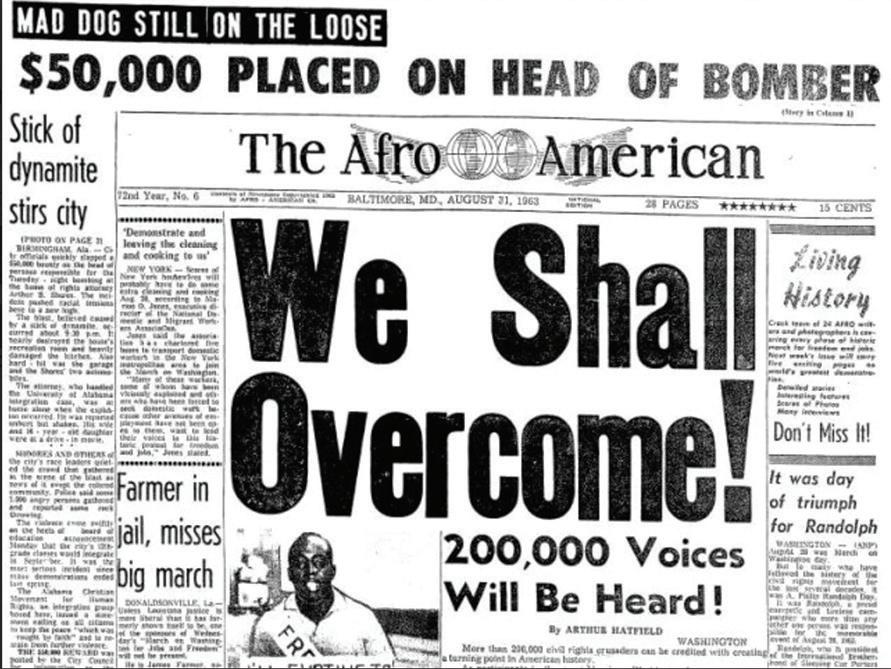
Members of the Black Press continue to make significant impact through journalism. Over the years, Black journalists have influenced laws and movements, improving the lives of African Americans across the nation. Shown here, an AFRO front page from Sept. 1963, advocating for civil rights.
March 9 on an annual basis.
The year before, President Joe Biden signed the Six Triple Eight Congressional Gold Medal Act of 2021, creating a public law that honored the women of the 6888th Central Postal Directory Battalion with the highest civilian award in the country. The group was made up of Black and Brown women, who helped clear an overwhelming amount of backlogged mail, ultimately aiding soldiers’ morale during WWII. As a result of reporting from the Black Press decades ago, the women of the 6888th Central Postal Directory Battalion are finally
receiving recognition in 2024.
“It was the Black Press that reported on the courageous work of the 6888th Central Postal Directory Battalion and who several years later, in 1948, reported that President Truman had ended segregation in the U.S. military,” said Mfume. “Black journalism is alive, bold and will always dare to be our voice,” said Mfume. “We are so very thankful for the contributions of Black media and its reporters, both past and present, for taking on and succeeding in this noble endeavor.”
As an advocacy organization, Leaders of a Beautiful Struggle (LBS) relies heavily on the ability to inform the community on happenings in the political arena. Our goal is to inform and put pressure on elected officials and major institutions to advance our agenda. This makes the continued presence of the Black Press more important than ever.
A causality of integration in America was the decimation of Black civic institutions that served as a home base for Black political and social life. As successful Black people began to benefit from integration and move away from the masses of our people geographically, socially and culturally, our institutions were weakened. As a result, White institutions were able to step in and more
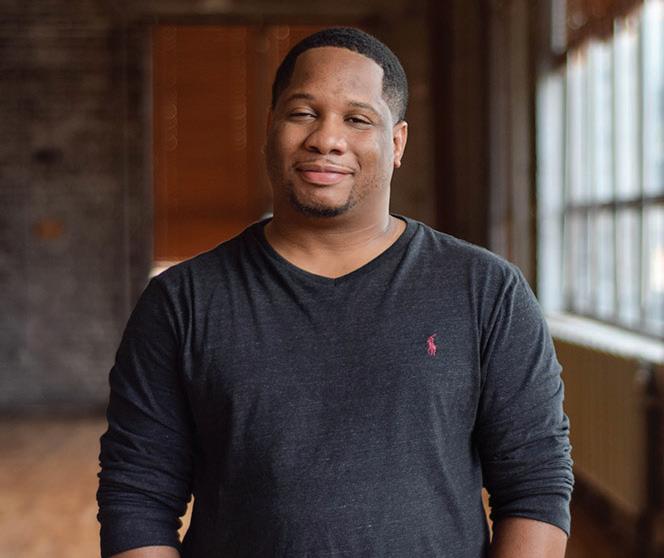
Dayvon Love, public policy director for the Baltimorebased think tank, Leaders of a Beautiful Struggle, speaks on the importance of working with Black Press to affect change in the Black community.
directly position themselves as curators of cultural, civic and political discourses that emerged from the Black community. This is a major
contributor to the stagnation experienced when it comes to advancing the societal position of the masses of Black people. In other words,
we can’t effectively pursue freedom if we don’t support the development of our own institutions.
LBS is unapologetic about our commitment to Black Liberation. Our effectiveness comes from our methodology of advocacy that focuses on Black people being the source of our power. LBS has a message and approach to advocacy that is not palatable to mainstream audiences. That said, we don’t spend any time thinking about how to get a White media organizations to legitimize our perspective. This limits the number of publications willing to publish our commentary pieces– and makes partnerships with Black publications invaluable. We are grateful for the continued partnership with the Black Press and will continue the tradition of working with Black media outlets to advance the struggle for Black Liberation.
As Black publishers, writers, editors and staff from across the country descend on Charm City for the 2024 National Newspaper Publishers Association’s annual national convention, the Afro Charities team culled the AFRO Archives for articles and photos about the organization and its roots. Nationwide, the archives of the Black Press have recorded important events, while also influencing present day decisions. Take a look below at some of the NNPA history enshrined in the AFRO Archives, dating back to the founding of the organization in 1940 and its predecessor, the National Negro Publishers Association.
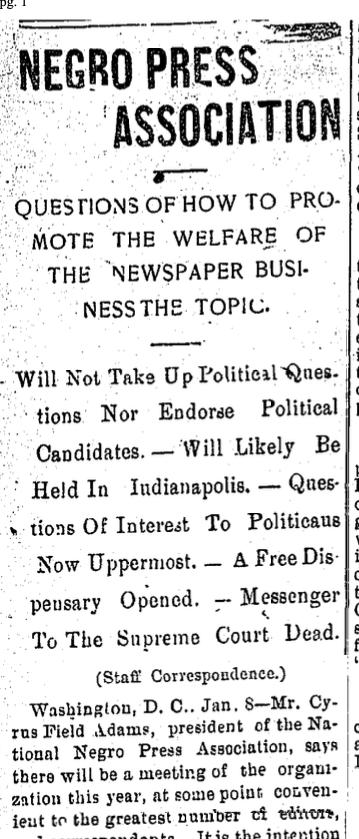
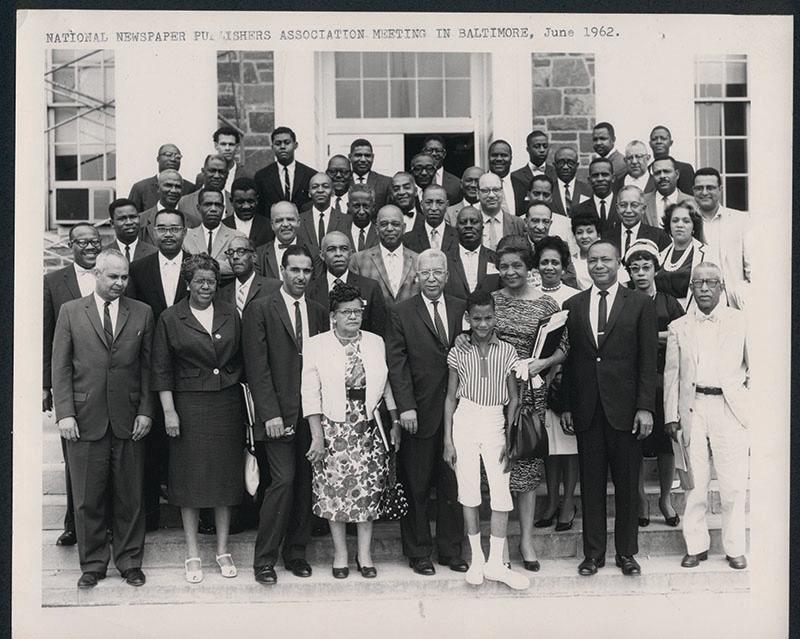
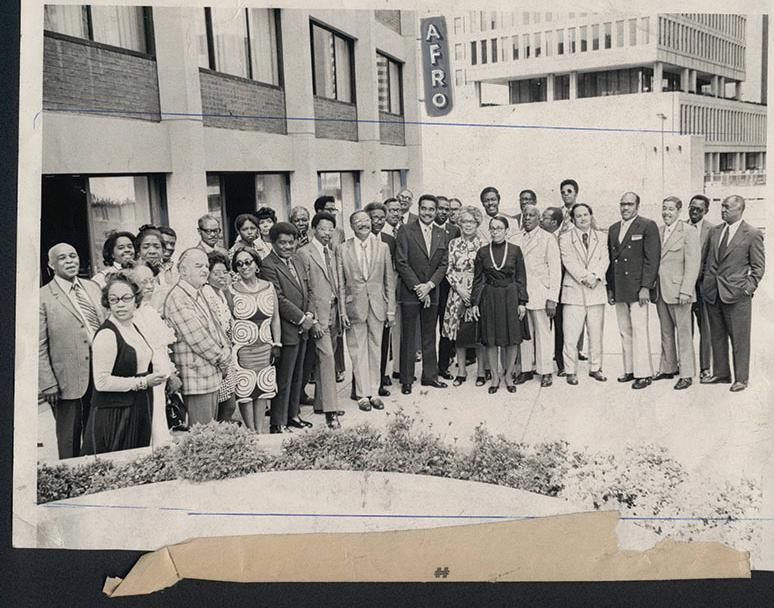

In the age of digital media many traditional Black publications have worked to strengthen their online and social media presence to stay relevant. However, as the landscape of journalism and media continues to change, publications are now competing against social media- based news organizations, such as The Shade Room and Bossip.
The two online platforms offer news aimed at Black communities, however a great portion of their content is centered around celebrity news. And while they do have official websites, their social media pages really helped them thrive.
To many, these kinds of news organizations are often thought of as entertainment and gossip news—never
“It’s not easy. The advent of technology has made it very difficult for newspapers to compete. When you see that a huge chunk of people get their news from Twitter or Instagram or Facebook– it’s madness to me.”
to be considered a reliable news source. However, despite their less than stellar reputation as credible news outlets, social media-based news organizations have hundreds of thousands of followers that look to them for their daily news updates.
“Unfortunately, a lot of people get their news strictly from social media instead of going directly to CNN, which has a daily newsletter that gives you the top news,” stated David Squires, a full time lecturer at North Carolina Agricultural and Technical State University (NCAT). “A lot of our










As traditional Black news publications evolve to stay relevant, many social media-based news platforms are thriving– even if their facts aren’t always accurate.
people are not going to those legitimate news sites, they are going to social media and looking at The Shade Room.”
Although Squires is disappointed to see the increase in people turning to social media for their daily news updates as opposed to traditional news outlets, he encourages members of the Black Press to collaborate with one another to create news that will appeal to a wider audience.
“Our people have to get organized and we have to partner with some of those social media platforms and create conduits that go both ways,” Squires declared.
Brian Bentley, Ed.D, is associate dean for the school of arts and sciences and an associate professor in the department of mass media arts at Clark Atlanta University. He has a vast amount of experience in the journalism industry and says he has watched it go through many twists and turns, leading up to where it currently is. Bentley spoke with the AFRO about what he believes to be a solution to the problem many traditional news outlets are facing.
“I think it’s prudent that those organizations establish a social media presence,” Bentley explained. “You can establish a social media presence, and still have credible content. I think that’s key. You have to change with the times.”
However, not everyone feels the problem is so easily solved. Other media professionals who spoke with the AFRO noted that the emergence of technology









has resulted in a stiff competition amongst traditional newspapers and social media news platforms.
“It’s not easy. The advent of technology has made it very difficult for newspapers to compete,” explained Sean Yoes, a filmmaker and media expert. “When you see that a huge chunk of people get their news from Twitter or Instagram or Facebook– it’s madness to me.”
Yoes went on to further discuss his frustrations with social media based news platforms explaining that there’s no way of guaranteeing they’re adhering to the guidelines of journalism or being truthful in their reports.
“I was brought into journalism under their original tenets– [learning] what it is to be a journalist and to be able to verify sources,” said Yoes, a former journalist and editor for the AFRO. “To be able to operate under the basic premise of who, what, when, where, why and how. To always tell the truth and to check facts. We’re operating against multiple platforms that may not adhere to any of those tenets. They just say stuff.”
Squires and Bentley are ensuring that budding journalists are well prepared to enter any newsroom and produce meaningful stories. Squires explained that in addition to different entities of the Black Press teaming up with one another, he also believes that every member of the National Newspaper Publishers Association (NNPA) would benefit greatly by working with younger journalists.
“Our young people have to partner with them and I know that our older, legacy media doesn’t have the staff that they had before,” said Squires. “But if they partner with the young people, they’d have a whole army of reporters that they could use.”
With the aging of the U.S. population, the number of people impacted by Alzheimer’s disease and related dementias (ADRD) is expected to increase. Although these last few years have seen exciting developments with the FDA’s approval of a new “disease-modifying” medication for early Alzheimer’s disease, the search for safer and more effective treatments continues, as does the need to ensure new medications are effective in diverse populations. A key piece of this is expanding our understanding of factors that influence an individual’s risk of disease-related memory loss, and differentiating brain changes that occur with aging vs. disease-related memory loss.

Multiple different types of studies are important for addressing these research questions. For example, observational studies, which may involve following individuals over time with memory tests, and sometimes non-invasive brain imaging, help improve our understanding of healthy aging and diseases that cause memory loss. They also help understand the ways in which these diseases impact individuals and families. Additionally, intervention studies (aka clinical trials) assess whether new treatments or lifestyle changes help reduce symptoms of memory loss or improve care for patients living with ADRD. Importantly, those with and without memory concerns and their caregivers may be able to participate in these different types of studies.
Participant diversity is essential. Researchers nationwide are working hard to expand the diversity of their research studies to ensure new discoveries benefit everyone. This includes brain health programs at the Johns Hopkins Alzheimer’s Disease Research Center (JHADRC), which supports a broad range of both observational and intervention studies. Here’s a few facts highlighting the importance of inclusive brain health studies:






















































• Baltimore City and Prince George’s County are estimated to have among the highest levels of Alzheimer’s diagnoses in the nation.
• Black older adults are two times more likely, and Hispanic older adults 1.5 times more likely than Non-Hispanic Whites to have Alzheimer’s and other dementias.
• Lesbian, Gay, Bisexual, Transgender, and Queer (LGBTQ+) people are 29% more likely to report early signs of dementia.














Reasons for these disparities are not well understood, but the JHADRC is optimistic that if more people from all backgrounds participate in brain health studies, together, we can make strides towards helping to develop new interventions that benefit everyone. Moreover, study participants may benefit from a better understanding of their own cognitive abilities and brain health through free exams and regular monitoring by health professionals. They can also be gratified by helping to advance improved treatments and preventive strategies for ADRD, contributing to the development of the next medical breakthrough, and making a meaningful difference from which they and future generations may benefit.
Learn more about getting involved:
• Visit “www.alzresearch.org” online, and look under “Participate in Research.”
• Call 443-542-7489


















































Transforming Baltimore: How smart legislation is making our streets safer
Back in April, I received an email from Dr. David Jernigan, a professor at Boston University School of Public Health. Dr. Jernigan informed me about a study published in JAMA Internal Medicine, which examined the impact of Senate Bill 571—legislation I proudly sponsored during the 2020 Legislative Session. The timing of this study is particularly significant as it coincides with the recent passage of similar legislation aimed at further improving public safety in Maryland’s 45th Legislative District.
The findings were eyeopening, especially for a city like Baltimore, where public safety and combating crime and violence are paramount for every elected official, law enforcement officer, community activist, parent, store owner and tax paying citizen. Passed in 2020, Senate Bill 571 reduced the operating hours for bars and taverns that sold packaged liquor in East Baltimore. The new operating hours were changed from 6 a.m. - 2 a.m. to 9 a.m. - 10 p.m. This legislation arose from a desperate plea from a neighbor in the Berea Community, who was concerned about a local store that had been the site of two shootings in the first week of October 2019. Researchers in Boston found that reducing the hours of alcohol sales in this East
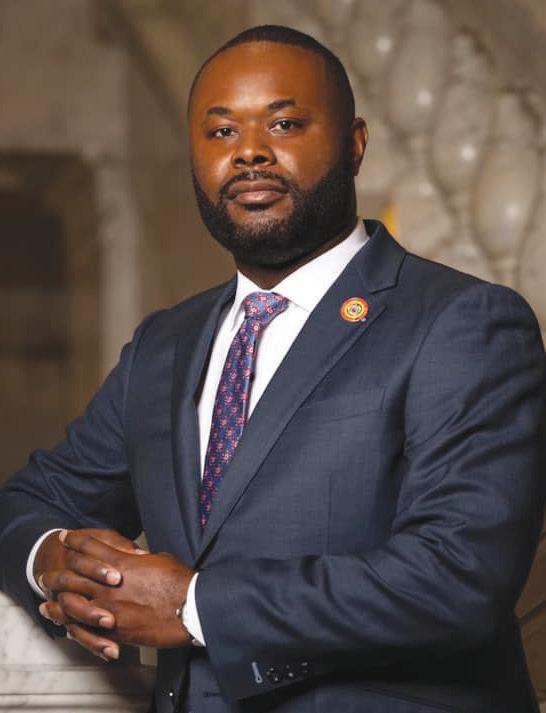
Sen. Cory V. McCray represents Maryland’s 45th Legislative District, advocating for equitable policy-making, public safety and community development.
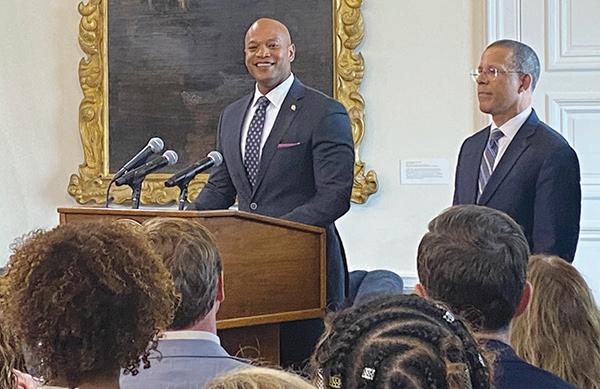 By Tashi McQueen AFRO Political Writer tmcqueen@afro.com
By Tashi McQueen AFRO Political Writer tmcqueen@afro.com
Maryland Gov. Wes Moore (D) alongside several top state officials and legislators announced a historical number of pardons, over 175,000, for convictions related to low-level marijuana offenses on June 17.
To the sound of applause, Moore emphasized that Maryland must address the consequences of criminalization done in large part by the war on drugs, a legal effort meant to address illegal drug use by increasing the incarceration and penalties of convicted drug offenders.
“We know that legalization does not turn back the clock on decades of harm that was caused by the war on drugs. It doesn’t erase the fact that Black Marylanders were three times more likely to be arrested for cannabis than White Marylanders,” said Moore.
in the lives, families and communities that were disrupted and destroyed,” said Baltimore City Mayor Brandon M. Scott in a statement after the ceremony. “For those receiving the pardons –which includes thousands upon thousands of Baltimoreans – it will be life-changing.”
Baltimore City is receiving an overwhelming 39,865 pardons, 22.77 percent, compared to Baltimore County’s 22,298, 12.74 percent, and Prince George’s County’s 21,080, 12.04 percent.
“I want to thank and commend Governor Moore for his commitment, compassion and love for the people who have been so impacted by this history,” continued Scott. “This action and our work together to overcome the dark legacy of our predecessors, will lay the foundation for a better, safer future for all of our residents.”
“Today, we take a big step enacting the kinds of policies that can reverse the harms of the past and help us to work together to build a brighter future.”
“Policy making is powerful. If you look at the past, you see how policies have been intentionally deployed to hold back entire communities. We are talking about tools that have led to the mass incarceration of Black men and boys.”
“To undo that kind of intentionality, we need to apply intentionality of our own,” said Moore. “Today, we take a big step enacting the kinds of policies that can reverse the harms of the past and to help us to work together to build a brighter future.”
Recreational cannabis use and possession was legalized in Maryland on July 1, 2023, for adults 21 and up.
Moore’s signing ceremony marked one of the largest state-level pardons in the country. The governor’s office said that an estimated 100,000 people will be impacted by the pardons.
In a virtual call ahead of the announcement, the governor’s office said there are no people currently incarcerated solely on misdemeanor charges in Maryland. Due to that, there will be no people released from jail exclusively due to these pardons.
“The legacy that the war on drugs has had on our city of Baltimore – and many places around the country like it – is still visceral and tangible. We still see and feel the wounds every day
Now that the executive order has been signed, the Maryland Judiciary will make sure every individual court docket is updated, notifying those who were pardoned by Moore of their status. The process should take around two weeks according to the governor’s office.
Moore’s executive order pardoned misdemeanor convictions for simple possession of cannabis and misdemeanor convictions for use or possession with intent to use drug paraphernalia.
Through this order, more than 150,000 convictions were pardoned for simple possession of cannabis and over 18,000 convictions for use or possession with intent to use drug paraphernalia.
“This legislative session, we prioritized re-entry reform and transforming our system in our state of Maryland for returning citizens. We focused on expungement and expanding expungements and making them automatic,” said Legislative Black Caucus of Maryland Chairwoman Del. Jheanelle Wilkins (D-Md.20), after the ceremony. “This is just really a true partnership in terms of the governor’s actions to absolve people of their crimes.”
When asked to respond to people who may not believe pardons for past marijuana convictions are necessary or helpful Wilkins said, “We know that it’s the right thing to do, and it moves us towards equity in our state.”
Morgan Park, historic Black neighborhood of Baltimore, receives historical marker
By Tierra Stone AFRO Intern tierrastone@afro.comResidents of the historically Black Morgan Park neighborhood in Northeast Baltimore came together on June 12 to officially unveil a historical marker in honor of the area and the legendary leaders who called the community “home.”
The Morgan Park neighborhood, founded in 1917, has been a jewel in the crown of Charm City for more than a century, evolving over time.
Juwauna Greene, assistant secretary for the Maryland Department of Transportation, spoke with the AFRO on what the historical marker meant for the community, which was the
“It is a call to action for us to cherish and protect our history.”
first suburb to be designed and planned for African Americans in Baltimore City.
“This is important because it stands as a living, breathing, testament. When people walk by and they’re living their daily lives they get to see this,” said Greene. “They get to see that marker, and they’ll stop for a moment,
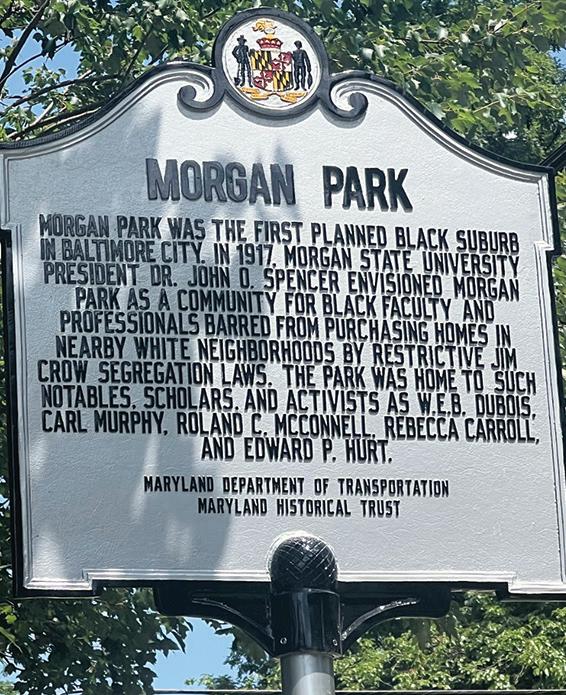 By Megan Sayles AFRO Business Writer
By Megan Sayles AFRO Business Writer
msayles@afro.com
Sonja Santelises will lead Baltimore City Public Schools (City Schools) for another year.
The Baltimore City Board of School Commissioners voted 8-1 to extend the CEO’s contract on June 12, weeks before it was set to expire on June 30.
Vice Chair Shantell L. Roberts opposed the extension. The one-year renewal is shorter than her previous fouryear terms.
“Tonight, the board is eager to engage in a contract extension with Dr. Sonja Santelises,” said Board Chair Ronald S. McFadden, during the public board meeting.
Santelises has been the head of City Schools since 2016, making her the longestserving CEO in the district in more than three decades. She previously worked for City Schools as chief academic officer from 2010 to 2013. As superintendent, Santelises is the highest-paid employee in the school system, earning $339,589 in 2023, according to OpenPayrolls.
“I just want to thank the board,” said Santelises during the meeting. “I want to thank team City Schools for the work that has led us to the point where we do see an increased trajectory of outcomes for our young people, but we still have
“We remain committed to collaborating with you and all stakeholders as we work to improve outcomes for each of our children and families.”
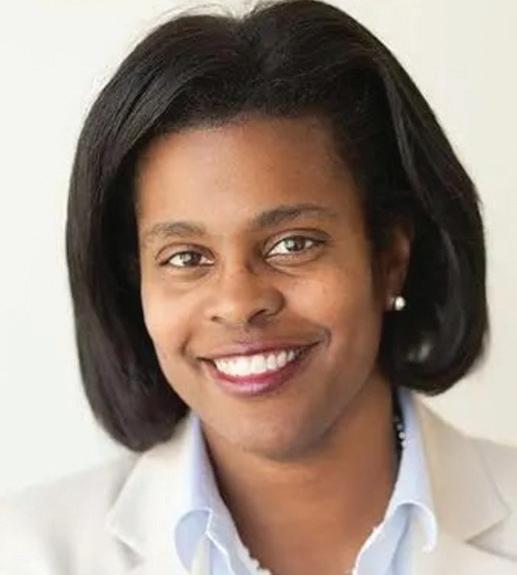
Baltimore City Public Schools CEO Sonja Sontalises’ contract will extend for another year, according to a vote by the Baltimore City Board of School Commissioners. The vote allows the superintendent to continue leading the district for the next year.
a good amount of work before us.”
For the 2024 to 2025 school year, Santelises will have a $1.786 billion-budget at her disposal, a $42 million, or 2.8 percent, increase from the previous year. It includes investments in math and literacy, early learning centers, career coaching, post-secondary success, summer programming, mental health and educator pipeline development.
Baltimore’s school system has long faced widespread criticism for poor building conditions, chronic absenteeism and low math scores. Under Santelises leadership, the district cut the number of schools without air conditioning from 75 in 2017 to 11 in 2023.
It has also opened a number of 21st Century Schools across
the city, with more coming down the pipeline. Math proficiency remains inadequate in Baltimore at 16.7 percent, lagging behind Maryland’s average of 40.3 percent, according to the Maryland Public Schools Report Card. City Schools encountered spikes in chronic absenteeism during 2021 and 2022, sparked by the COVID-19 pandemic. But, in his 2024 State of the City address, Mayor Brandon M. Scott touted a 12 percent reduction across all schools. Scott and Santelises launched the Mayor’s Attendance Challenge ahead of the 2023 to
Continued

Continued from B1
Baltimore community from 20 hours to 13 hours a day resulted in a 23 percent annual decrease in all violent crime. Violent crime is defined as any incident where the offender uses or threatens to use harmful force against another person, animal, or object. One month after Senate Bill 571 went into effect on July 1, 2020, the community experienced a 51 percent drop in homicides. This was followed by a 40 percent yearly drop in homicides for the community.
The study included data from May 1, 2018, to December 2022. In essence, Senate Bill 571 achieved more than the community, city leaders, and I had hoped for.
Our young scholars deserve to walk to school and play in their community without constant worry from parents and guardians about violence breaking out. What message are we sending to our young people when liquor stores are open at 6 a.m. before the school bell rings at 8:30 a.m., while they are walking to school? Furthermore, all our residents– both young and old– deserve to feel safe in their neighborhood.
The Berea Community, like many others in East Baltimore, has long suffered from the ripple effects of poorly regulated alcohol sales: increased crime, violence and a pervasive sense of insecurity. The legislation was less about regulating liquor sales and more about reclaiming our neighborhoods amidst high crime and violence. No other jurisdiction in the state of Maryland allows liquor establishments to be open for 20 hours a day– so why did Baltimore City?
Building on the success of Senate Bill 571, the C.A.R.E. Community Association and McElderry Park within Maryland’s 45th Legislative District followed in its footsteps with the passage of Senate
Bill 45 this year. As the Senate sponsor of Senate Bill 45, I am proud to say that this legislation was signed into law by Gov. Moore on May 16, 2024. I would also like to acknowledge the strong leadership of Del. Jackie Addison, who led the effort in the House of Delegates. This legislation, similar in nature to SB 571, reduces the hours of liquor stores and taverns that sell packaged goods to 9 a.m. until 10 p.m. in both communities. In other words, these establishments cannot operate outside of these hours, further aligning with our efforts to reduce activity that has the potential to lead to crime and improve community safety.
Senate Bill 45 was born out of redistricting (which added both communities to the 45th district), the calls from residents for a safer environment following a rise in violent crime, and the necessity to protect our neighborhoods.
The continued effort to regulate liquor sale hours is a testament to the commitment of our communities and leaders to prioritize public safety and well-being. It’s not just about changing laws; it’s about changing lives. And that’s a responsibility I, and hopefully every policymaker, take very seriously.
While historical disinvestment explains many of the deep-rooted issues our communities face, it’s clear that Senate Bill 571 is not the sole solution to combating all crime. However, I do know that SB 571, along with SB 45, are tools in our arsenal that have proven effective. Both are necessary measures for East Baltimore, and their positive impacts further magnify what can be achieved when we prioritize the safety and well-being of our communities. Let this be a reminder that meaningful change is possible, and it starts with listening to the voices of those we serve.
Continued from B1 and say ‘‘‘I’m standing on some sacred ground.’”
Raquel Simpson, chair of the Morgan Park Improvement Association History Committee, shared what she loves about living in the community.
“I moved here in December 2016 and when I moved in I felt right at home,” she said. “People embraced me and my family. I always felt at home and I always felt welcome. We’re still trying to preserve that in our neighborhood.”
Though Simpson was welcomed with open arms, that hasn’t always been the case.
At one point, Jim Crow laws prohibited African Americans from sharing spaces with White people in Maryland. This included schools, restaurants and neighborhoods. Subsequently, Baltimore was responsible for writing the first housing segregation laws.
The Maryland Center for History and Culture reports that “one of the first official policies was Baltimore City Ordinance 610, known as the ‘West plan’ –named after councilman Samuel
West. This ordinance, passed by the city of Baltimore in December of 1910, stated that no Black resident could move onto a block in which more than half of the residents were White and vice versa.”
According to “The History of Morgan Park” by Roland C. McConnell and “The City as Suburb,” by Eric L. Holcomb, when Morgan College, now Morgan State University, moved to its current location in Northeast Baltimore, the parcel of land designated for the school included Morgan Park.
“Seventy acres were proposed to relocate Morgan from West Baltimore. Part of the acreage included Morgan Park, a small thirteen acre development attached to Morgan College, that would also accommodate faculty and staff,” reads information from The Gazelle, a hyperlocal publication printed by the Morgan Park Improvement Association.
Leonore Burts, longtime resident of the Morgan Park Community, spoke on how White residents of Baltimore time and time again challenged the relocation of the school, and thus, Morgan Park.
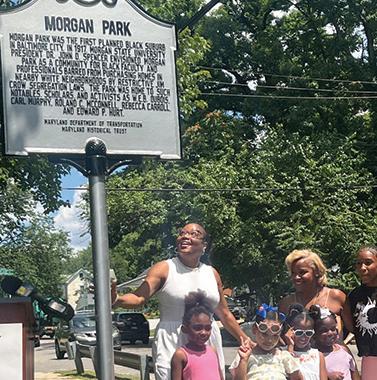
“We had three court cases with people from the neighborhood nearby who didn’t want Blacks to move in because of all of the press about how we would bring down the neighborhood and everything negative,” she said.
Ultimately, Morgan College leadership
was successful in securing land for the institution and the residential area known as Morgan Park. The area was home to W. E.B. Dubois, the first AfricanAmerican man to earn a Ph.D from Harvard University, Dr. Regina Goff, the first AfricanAmerican assistant commissioner in the United States Office of Education under the Department of Health, Education and Warfare and AFRO Publisher Dr. Carl J. Murphy. Through the years, the Morgan Park Improvement Association has strived to upkeep the idyllic charm of the community, while also preserving its rich history.
Valencia Baker, president of the Morgan Park Improvement Association spoke with the AFRO about the history of the neighborhood and credits Burts for her work regarding the marker.
“Leonore Burts, who lives in the Du Bois house, is the person who coordinated that effort for us. She did all of the leg work and all of the writing to get us established,” said Baker.
Burts said there were multiple steps in how the marker came to be.
“I applied for a grant for us to pay someone to write our nomination because it’s a 70 to 100 page document and it has all these requirements for photographs and for the significance of the neighborhood. The person that we hired is the one that provided all of the documentation,” she said.
Burts also explained that the process took about three years before it reached completion.
According to the Maryland Department of Transportation (MDOT) “Maryland has installed cast metal Historical Markers along state roads signs since 1930. Approximately 800 Historical Markers have been installed since 1930 and around 780 remain today.”
Simpson said the day of the marker unveiling was a special one.
“Having that sense of community where we get to socialize with each other and
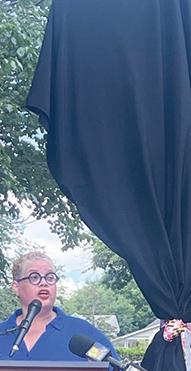

“It
Burts
“You

Continued from B1
2024 school year to encourage students to come to school.
The district has also experienced controversies with Santelises at the helm. In 2022, Maryland Inspector General for Education Richard P. Henry released findings from an investigation into City Schools’ grading. The examination was brought on by claims that teachers were pushed to change failing grades to passing ones
between 2016 and 2020. The agency reported that there were more than 12,000 grade changes across City Schools. The system has since revised its grading and reporting policies, including implementing a technology system for improved tracking and monitoring and ensuring no one person is exclusively responsible for grade entry and review.
“Tonight, the board is eager to engage in a contract extension with Dr. Sonja Santelises. We remain committed to collaborating with you and all stakeholders as we work to improve outcomes for each of our children and families.”
In March 2024, an independent audit conducted by consulting firm Alvarez and Marsal reported that there was no evidence of pervasive grade manipulation in the district during the 2022 to 2023 school year.
Commissioner Andrew Coy said he was glad that the school board finally arrived at a contract vote. Typically, contract negotiations are
finalized in March or April. “It was certainly giving me a lot of anxiety to be this late in the school year and not have this concluded yet,” said Coy during the board meeting. “While I know there’s been a diversity of opinion among the board, it certainly makes me relieved to have a consensus for a vote and for the district to benefit for another year of Dr. Santelises’ leadership.”
Congressman Kweisi Mfume (MD-07) announced on June 5 that he has been appointed to the U.S. House Committee on Foreign Affairs. The decision to appoint the veteran congressman was made by Democratic Leader Hakeem Jeffries and was later unanimously approved by the U.S. House Democratic Caucus.
“From my time on the Baltimore City Council, fighting to divest city funds from the then-apartheid government of South Africa, to working alongside former President Bill Clinton to bring peace and order in Haiti, I have never shied away from using whatever platform I have had to find solutions to global problems,” stated Mfume.
While serving in this position Mfume will be responsible for oversight and legislation regarding national security developments affecting foreign policy; foreign assistance; the Peace Corps; strategic planning and agreements; war powers,
treaties, executive agreements and the deployment and use of United States Armed Forces. He will also be lending his expertise to peacekeeping, peace enforcement; enforcement of United Nations or other international sanctions; arms control and disarmament issues; arms control and disarmament issues and a plethora of other matters.
“This appointment is a tremendous honor and responsibility that I do not take lightly given today’s state of affairs. I look forward to joining my colleagues on the House Committee on Foreign Affairs to ensure the United States remains an advocate for peace, security, and equality both at home and abroad,” said Mfume.
Although this role with the U.S. House Committee on Foreign Affairs is Mfume’s most recent venture in the world of politics, he has a lengthy record when it comes to serving his community and our nation. He’s served as a member of Congress under five presidents, including Presidents Ronald Reagan,
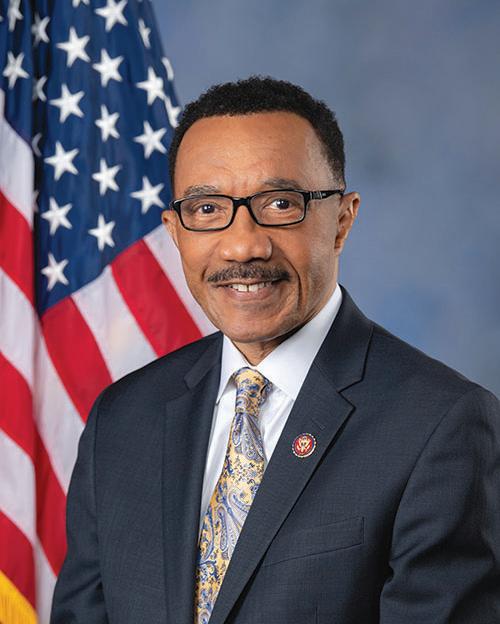
Congressman Kweisi Mfume (D-Md.-07) is now a member of the U.S. House Committee on Foreign Affairs.
George H.W. Bush, William J. Clinton, Donald J. Trump, and Joseph R. Biden. He is currently working in Congress as a member of
the Congressional Ukraine Caucus and the Congressional Caribbean Caucus. In addition to this, he has witnessed and served through
events such as the fall of the Berlin Wall, the dissolution of the Soviet Union, the first
to the strife in the Middle East, there are so many hotspots today that require strong
“This appointment is a tremendous honor and responsibility that I do not take lightly given today’s state of affairs. I look forward to joining my colleagues on the House Committee on Foreign Affairs to ensure the United States remains an advocate for peace, security and equality both at home and abroad.”
Gulf War, the Panamanian incursion (“Operation Just Cause”), U.S. intervention in Haiti (“Operation Uphold Democracy”), attempts to coordinate foreign interference in U.S. elections, the rise of global cyberthreats and the abolition of apartheid in South Africa.
“From the famine in Africa
voices for fairness. I have worked tirelessly throughout my life and in many different capacities to address global issues that impact our people,” Mfume said. “I am eager to utilize my experiences and begin working now as the only Maryland congressperson appointed to the House Foreign Affairs Committee.”
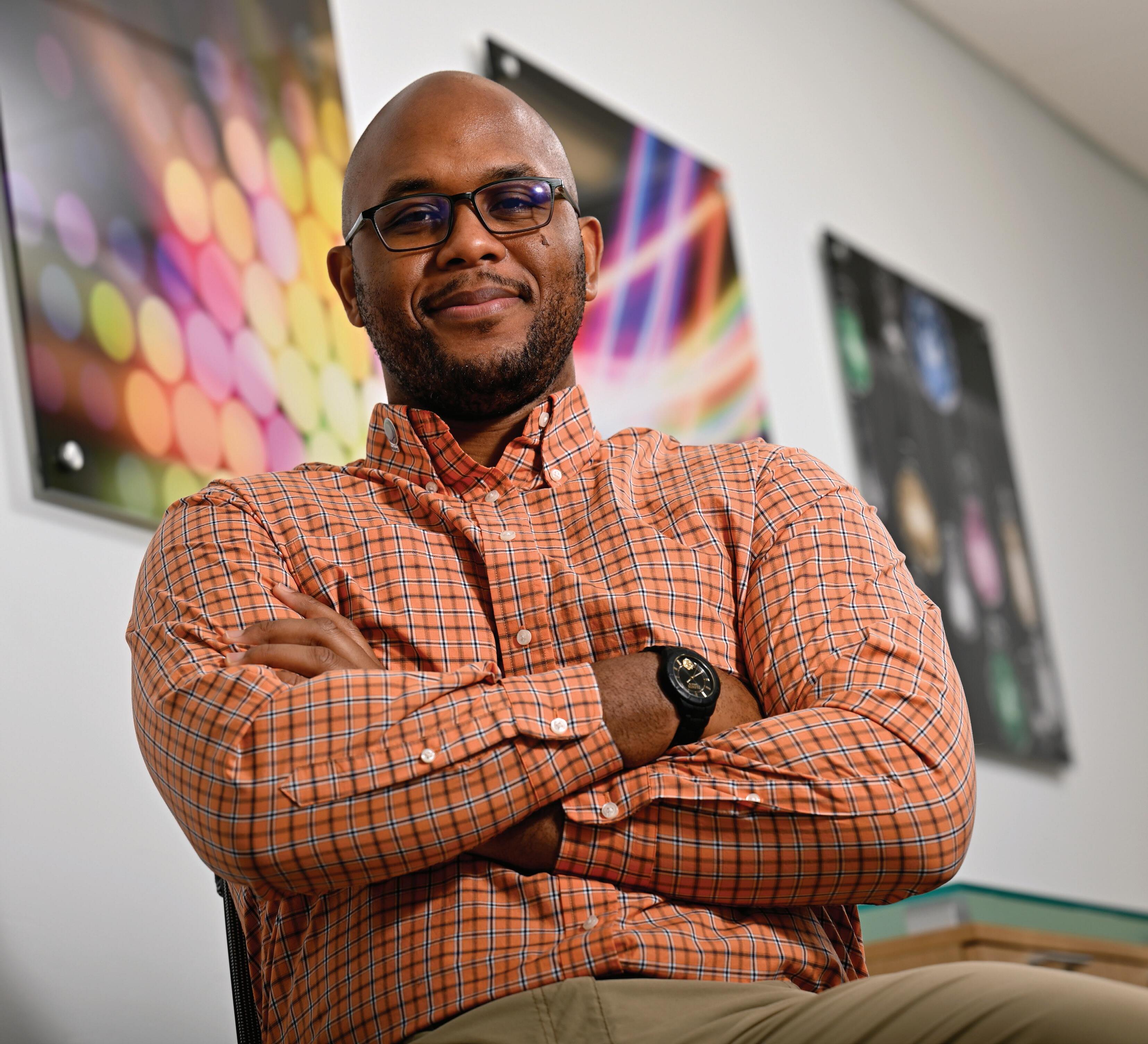
BGE celebrates Juneteenth as an important point of reflection for all Americans — a time to understand that the struggle against racial injustice is far from over, and that we must all work for true equality. At BGE, we’re all in as we embrace a culture of respect, equity, and inclusivity. We’re working together with our employees and our customers to build on what’s important to everyone. bge.com/Diversity

 By Tierra Stone AFRO Intern tierrastone@afro.com
By Tierra Stone AFRO Intern tierrastone@afro.com
And Lizzie Suber
AFRO Intern lizziesuber@afro.com
Northrop Grumman’s Maryland Fleet Week and Flyover event was held from June 12 to June 18. While residents and tourists could attend festivities at the Baltimore Inner Harbor, events took place throughout the Charm City, attracting interest from people of all age groups and backgrounds. In addition to downtown Baltimore, events were held at Martin State Airport, Fells Point and the Under Armour Pier. Fleet Week activities included science, technology, engineering and math (STEM) programming and festivals.
Attendees were able to recognize the sacrifices of veterans, celebrate current service members, learn about Navy life and tour Navy ships, while the entire city was able to enjoy the excitement of jet flyovers. This week, the AFRO conducted interviews with civilians and naval officers about the annual occasion and the importance of having Black naval officers in the service.


“A lot of people feel like reaching for the stars is impossible. I think if you see that representation it’s like ‘Oh, they’re doing it…I can do it too.’ ”



think it’s important because we’re a part of the country. We helped build it–so we help protect it.”
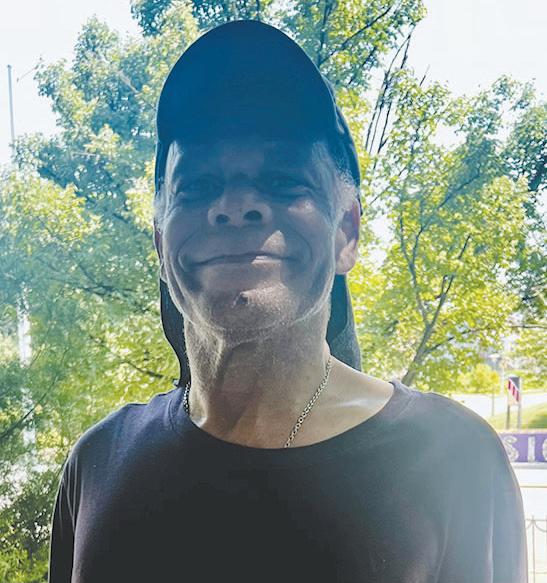
“I

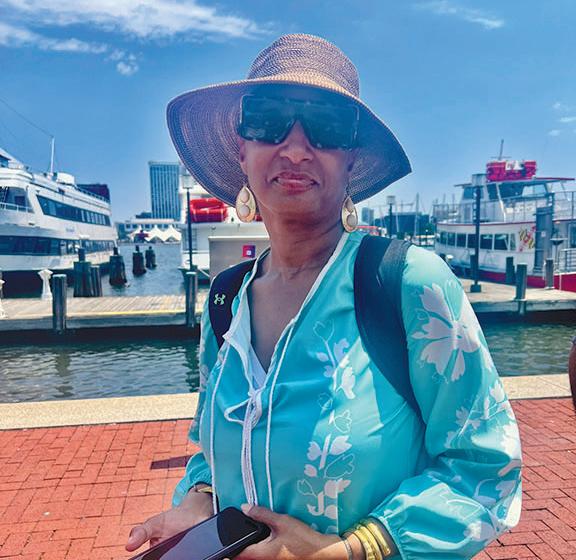
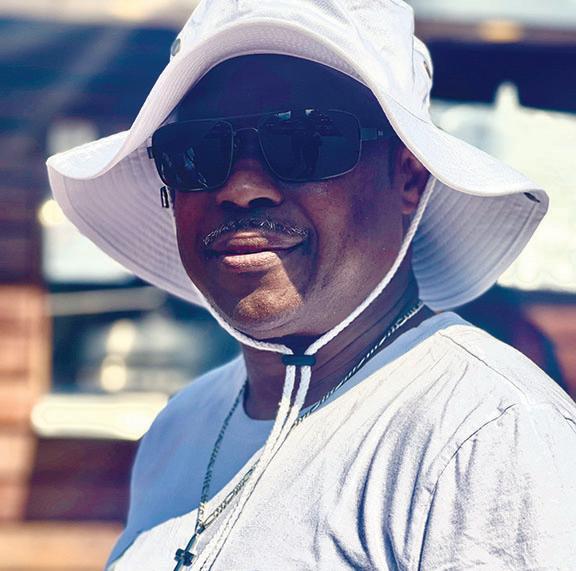

As the population ages, it becomes increasingly important for senior citizens to maintain good physical health. According to the Population Reference Bureau, an organization that works with the U.S. Census Bureau to provide nonpartisan research data, “the number of Americans ages 65 and older is projected to increase from 58 million in 2022 to 82 million by 2050–a 47 percent increase– and the 65-and-older age group’s share of the total population is projected to rise from 17 percent to 23 percent.”
Harold Sanco, a 62-year-old professional fitness coach from Washington D.C., sat down for an interview with the AFRO to discuss ways senior citizens can improve their physical fitness. Sanco has been a professional trainer since 1989. He shared dietary recommendations, suggested good exercises for seniors and precautions to take.
AFRO: What exercises are most beneficial for seniors and how would you modify those activities to accommodate for age?
Harold Sanco: For seniors, activity should be something that they enjoy and have access to. It doesn’t have to be very expensive, like a gym– it could be as simple as a walk. The thing to remember, for seniors, is to make sure they are exercising safely and adequately. How many times a week are you gonna walk? How many times a week are you going to do any type of exercise? It could be swimming, it could be tennis, it could be pickleball. It could be any sport, as long as it’s something that’s regular. I’d say three to four times a week is an adequate goal out of a seven-day week. Your initial start could be 30 minutes, with an increase to 45 minutes and then an increase to an hour, until you feel like you can go over an hour.
AFRO: What precautions should seniors take before starting a new exercise routine?
HS: Before seniors start exercising, they should have
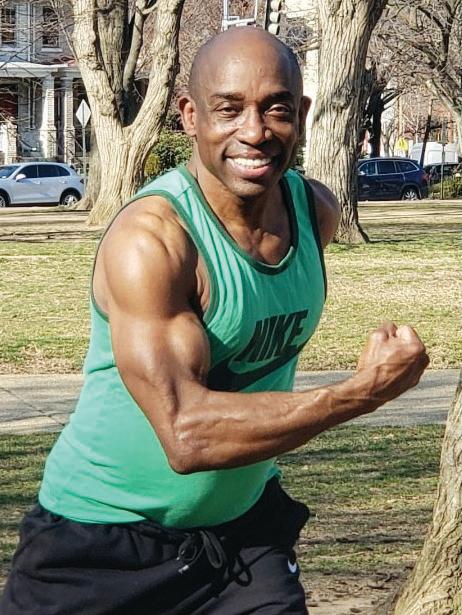
a physical done with their doctor first and monitor the intensity of their exercises in the beginning. They should start with moderate exercises to gauge their ability and not exert a lot of energy. The important thing is the recovery. If you work out Monday, how do you feel the next day? If you can get out of bed and feel energetic, you’re doing a good job. If you can’t move the next day, you probably overexerted yourself. Keep everything moderate to where
you can do it three to four times a week.
“Before seniors start exercising, they should have a physical done with their doctor first and monitor the intensity of their exercises in the beginning.”
AFRO: What are some indicators that a senior should stop exercising and consult a healthcare professional?
HS: Excessive soreness and achiness in the joints are hints to see a healthcare professional. This can be because of the lack of hydration, being lightheaded or feeling dizzy. Those are big things to get checked right away.
AFRO: What key dietary considerations should seniors take to support their fitness goals?
HS: Senior citizens should make sure they’re getting enough protein, carbohydrates and fats in their diets daily and a proper amount of calories. That really depends on if you are a male or female. During a physical, the doctor will give you a base to start with and from there you will know your meal intake. When you’re trying to exercise, make sure you’re drinking enough water and eating a balanced meal.
AFRO: What are the best practices for managing common dietary concerns in seniors such as high blood pressure and diabetes?
HS: Someone with high blood pressure needs to check in with a healthcare professional before and after their workouts. Someone with diabetes should check their insulin and monitor it before they exercise.
This article has been edited for brevity and clarity.


Being able to maintain mental health and being able to spot the potential signs of declining mental stability is imperative in the Black community. Keeping track of the wellbeing of loved ones is important, especially during a time when mental health is on the decline.
This week, the AFRO spoke with psychiatrists and mental health experts about the significance of maintaining mental health during the golden years and how to recognize the signs of declining mental health.
1. Change the narrative
Dr. Tedra Anderson-Brown, a respected psychiatrist in Durham, N.C., spoke with the AFRO about the Black community, mental wellness and the importance of changing harmful narratives.
“For a long time, we’ve learned that if you say something about [mental health], people will treat you differently,” expressed Brown. “We really have to change that narrative by being open and talking about mental wellness and how we can change that narrative.”
It’s hard to fix something when the solution is kept a secret. Mental health resources are available outside of the doctor’s office these days, and help can often be found in places like churches, human resource departments, libraries, schools and recreation centers as a starting point.
2. Find a communityyou’re not alone
Being a part of a community is a simple

“Mental health” might be a buzzword, but it is certainly not an issue to gloss over–especially within marginalized communities.
and safe way to improve mental health.
Participating in neighborhood activities and community events are one way to improve mental health. Kim Lily, a mental
“We go to see a doctor at least once a year, I recommend that same kind of preventative care for the brain.”
health specialist, says being engaged is a good way to be proactive about emotional and mental wellness.







Lily said it’s important for mental health advocates to “educate through various media platforms, involve community leaders and organizations and offer support groups.”
3. Be able to spot the signs
Going to the a primary care physician to get a check-up is something that people don’t think twice about, the same should be true when taking care of the brain.
“We go see the doctor at least once a year, so I recommend that same kind of preventative care of the brain, in terms of a mental health perspective,” said Dr. Brown. “Make sure that your memory is good and make sure that you have an assessment for stress, anxiety or depression.”
4. Have a routine and keep up with it
Having a routine is important and promotes structure and physical activity. It reduces stress and feelings of being overwhelmed by making tasks more manageable.
Routines make daily living feel more organized and under control as well as establish independence.
Having daily regimens gives older adults a sense of stability, activity and social connection - all of which are protective factors against isolation and depression.
5. Know what mental health looks like
There are various ways to take care of your mental health. Knowing what works for the individual is important. From hobbies, journaling, exercising, spending time with loved ones and more, find what positively impacts your mental health and stick with it!
Senior citizens should also be informed on mental health and what it looks like when someone is struggling emotionally or mentally. Things such as chronic illness, loss of loved ones or retirement can all affect mental health as one ages. Signs of depression, according to the National Institutes of Health, include but are not limited to feelings of helplessness, continuous sad or anxious moods, fatigue and irritability.
Good mental health provides resilience during new and sometimes difficult transitions in life. Even if you are in your senior years, it’s not too late to take control of your mental health today!
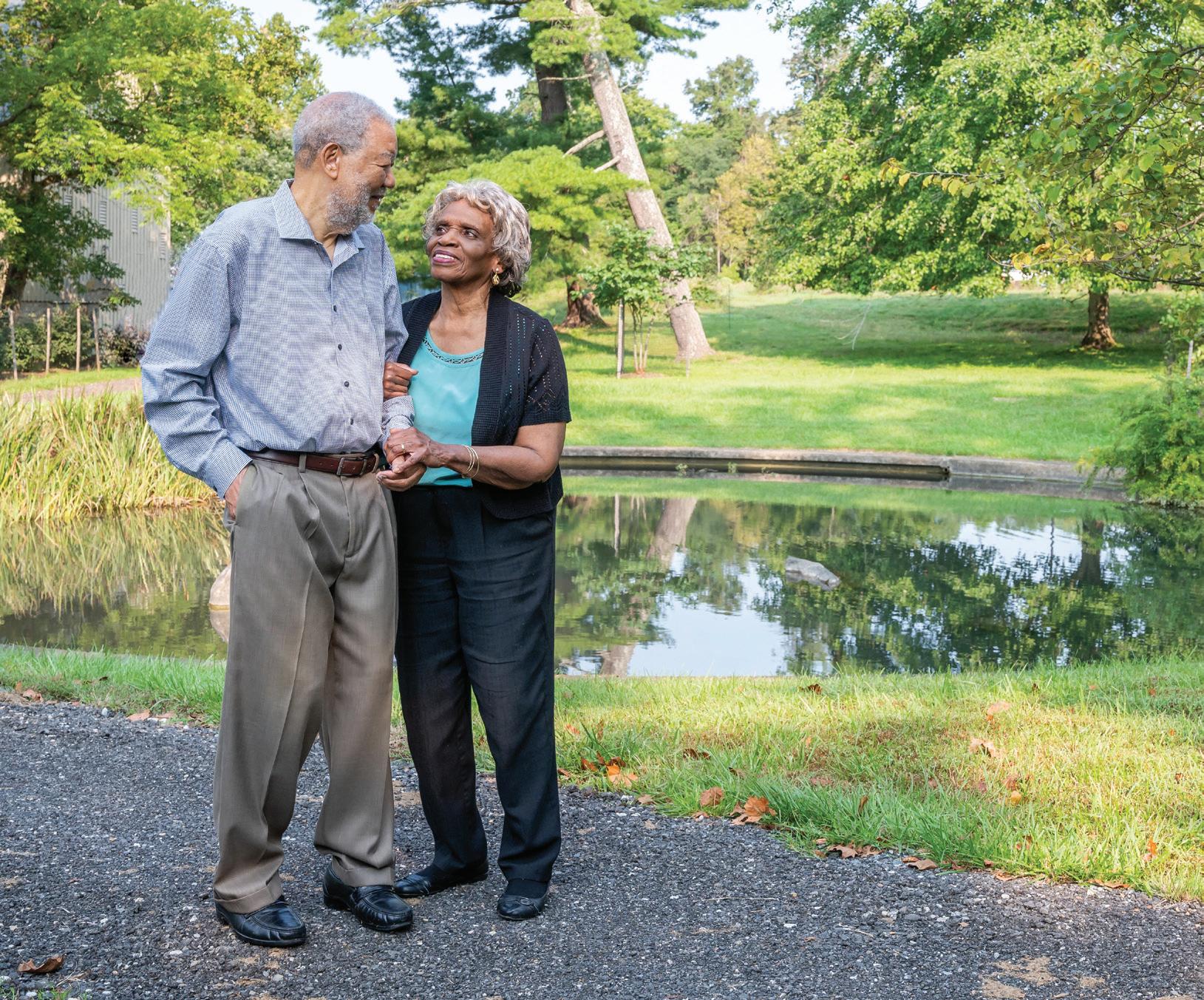
Now’s your time to enjoy it all. In our diverse and inviting Life Plan community, surround yourself with people you’ll like and social opportunities you’ll love. Settle into a home amongst nature, supported by a continuum of care for every age and ability. At Broadmead, you’ll be able to focus on a lifestyle you truly enjoy!


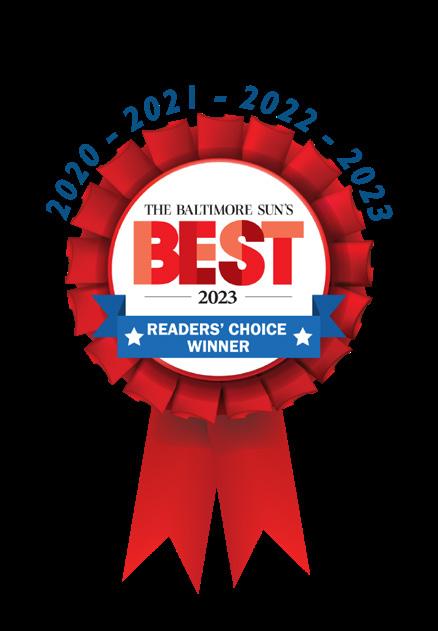

The consumption of alcohol is something you can find throughout many parts of Black history and culture. Whether it be Snoop Dogg’s 1994 hit “Gin and Juice” or the infamous Billy Dee Williams ads, used to promote Colt 45 Malt Liquor, alcohol has been woven deep into Black culture which has resulted in a normalization of its consumption.
From Juneteenth cookouts to graduation parties, weddings and even baby showers– some members of the Black community associate the idea of relaxation and enjoyment with liquor.
“In my family alcohol use was very prevalent and I myself associated alcohol with fun. In Black communities, we associate fun with alcohol. My family was no different–everybody drank,” stated Donivan Stone, a recovery counselor at First Step Recovery Center in Columbus, Ohio. “Later on in my life drinking really became like a marriage that I felt was made just for me.”
Studies and research throughout the last 30 years have shown that Black communities, along with other minority communities, have a proportionately higher rate of alcohol advertisements. In 1998 it was reported by the National Institutes of Health that Black and Latino neighborhoods had more advertisements for alcohol and tobacco than White and Asian neighborhoods. It was found that 23 percent of the billboards in Black neighborhoods were advertising alcohol, in comparison to the 13 percent of alcohol related billboards in White neighborhoods.
Despite social norms, cultural significance and an increased amount of advertising in predominantly Black areas, Black people are less likely to consume and abuse alcohol in comparison to their White counterparts.
In November of 2023 it was reported by AlcoholRehabGuide.org that “African-Americans are reported to drink less than their Caucasian counterparts. Historically, AfricanAmericans have consumed lower
amounts of alcohol. Although alcohol consumption is lower compared to Caucasian-Americans, AfricanAmericans have been victims of alcohol-related illnesses.”
“We have a lower number for use than our Caucasian counterparts, but we have more negative consequences from the use of alcohol. We suffer more mental, physical and health problems because of the alcohol use in the Black community,” said Carol Stegall, a senior counselor at the Afrocenticentric Persona Development Shop in Columbus, Ohio. “Alcohol has a dramatic impact in the Black community. Whether it be health,socioeconomically or mental health wise– we are impacted at a greater rate.”
Stegall has been working in substance abuse for over 20 years and throughout her career she’s been able to focus specifically on how the Black community is affected by it. She went on to explain that although Black people are less likely to drink, the effects of drinking are a lot more severe on Black bodies.
Stegall said that Black people deal with an increased predisposition to alcohol, which makes it a lot more addictive for us. Stone furthered Stegall’s point by noting how predisposition leads to addiction

Substance abuse professionals note that Black people have a higher genetic predisposition to alcoholism, despite having lower alcohol consumption rates than their White counterparts.
that someone who has two drinks everyday is an addict. On the other hand, someone who drinks a lot once a week is dealing with a substance abuse disorder.
and I grew kind of fond of alcohol. I thought it was something I could control not knowing it was already controlling me.”
to a youth recovery program by her father. However, that treatment ended up being her first of many attempts at sobriety. Throughout the years she would lie and manipulate her friends and family to keep their concerns about her alcoholism at bay but her behavior became a major indicator that her addiction was progressing.
Much like Stone, Hudson’s addiction was only being hidden from herself. She was a functioning addict who was able to provide for her family so she never considered herself an alcoholic. It wasn’t until she began to neglect her children and become homeless that she even remotely considered herself to have a problem.
“I didn’t think I had a problem. I was making good money and I had nice things for myself and my kids. In 2006 I got a divorce and that set everything off,” Hudson said. “I started drinking really heavily and I stopped taking care of my kids. I was leaving them with my parents, meanwhile I was homeless and couchsurfing every night. I was losing things, but I wasn’t realizing that I was losing things.”
“When you have a higher genetic predisposition to alcohol, addiction is bound to happen; you just don’t know when. Sometimes you can drink 100 times and that genetic predisposition never kicks in–and then that 10th time it kicks in and the addiction comes alive,” Stone said.
Stone started drinking at an early age, having first tried alcohol at a family gathering. Throughout the years he says he went on to struggle
“Alcohol has a dramatic impact in the Black community. Whether it be health, socioeconomically or mental health wise–we are impacted at a greater rate.”
financially, face imprisonment and deal with severe grief before finally reaching sobriety in 2010.
He further explained that addiction isn’t based on the amount of substance consumption, but the frequency of it. The abuse expert shared the difference between someone who is dealing with an addiction as opposed to a substance abuse disorder, noting
“The first time I drank I was about 12 or 13 and it was at my grandmother’s house during a spades party. I had a sip of beer and it was gross, I told myself I’d never drink it again. The next time I drank anything it was with my friends and I got sick and swore I’d never drink again,” Stone recalled. “By then, I think the addiction had kicked in though
Although Stone didn’t recognize the severity of his addiction at the time, he later would begin to as he saw affect it those around him. Admitting that he was rather smooth with hiding his addiction, he thought those around him were oblivious to the ever-growing issue. However, he, like many other people who deal with substance abuse issues, was clearly changing for worse.
Like Stone, Cherron Hudson, a recovery counselor at First Step Recovery Center in Columbus, says she began drinking at an early age too.
“I started drinking at the age of 12, but my dad was in denial. My aunt kind of knew– but it wasn’t until my freshman year of high school when my dad found out,” stated Hudson.
“I had drank some M.D. 2020 at the bus stop with my friends one morning before school and I went to first period. I was in that class the entire day because I passed out. I got suspended for intoxication and that’s when my dad found out.”
Hudson shared that following her suspension from school she was sent
In August of 2013, Hudson got into a car crash that served as her wake up call to what was truly going on in her life. In the past 11 years she’s maintained her sobriety while earning a plethora of certifications, and experience that have allowed her to help others overcome their addictions.
All three experts explained that addiction can be overcome and the first step is honesty. Both Stone and Hudson shared how important it is to be honest with yourself about the substance abuse issues you may be dealing with. However, Stegall noted that being honest about the behaviors of family members is just as important so you know what genetic predispositions you may be facing.
“We have to be honest about the issues going on in our families. If we’re not honest about something being an issue then it never gets treated like an issue and that leads to normalization,” Stegall said.
“Hiding the truth doesn’t do any good, especially because knowing what you’re genetically predisposed to is a huge part of avoiding addiction.”
women call attention to the poor medical outcomes,
The marginalization of Black women in health care continues to be plagued by dismissive medical professionals and practices.
Historically, Black women experience disproportionately poor health outcomes. Stress, pervasive racism, gender discrimination and exclusion from clinical research have farreaching effects on their overall health. Black women have a more significant chance of dying in childbirth than White women—approximately four times the rate of White women. Approximately 60 percent of those deaths, according to medical experts, are preventable.
In 2021, the maternal mortality rate for Black women was 69.9 deaths per 100,000, a significant jump from the average of 26.6 deaths per 100,000 for White women.
The American Cancer Society reports that about one-third of African-American women experienced racial discrimination from healthcare providers. According to Health Equity Among Black Women in the United States, a Journal of Women’s Health article authored by the National Institutes of Health (NIH), the health disparities experienced by Black women are the “reflection of the inequalities experienced by Black women on a host of social and economic measures.”
The lack of quality care provided to Black women extends beyond America’s borders.
Research by the NIH reveals the social determinants of treatment for Black women in Canada, fueled by race evasiveness, are equally concerning. Canada’s healthcare system operates with a colorblind model, behaving as if race is a non-determining factor. The report maintains that Canada’s ideology “denies, minimizes, and ignores how race impacts healthcare for Black women.”

Unsplash/hush naidoo jade photography
Studies show that Black women are disproportionately impacted by health disparities, for a variety of reasons including a lack of access to care and health insurance.
Erin Baker believes she’s been victimized by America’s broken healthcare system.
“Black women are mistreated in healthcare due to systemic racism,” explained Baker, whose medical mishaps included two miscarriages.
After suffering an ectopic pregnancy in 2018, Baker’s obstetrician cautioned her that all future pregnancies would be treated as high risk. However, when Baker became pregnant four years later, she maintained that doctors failed to treat her pregnancy with the medical attention it required.
“My bloodwork wasn’t monitored as it should have been. They weren’t monitoring my HCG (human chorionic gonadotropin) levels as they stated they would. The doctor rushed and did not follow up with care when she couldn’t hear my baby’s heartbeat,” Baker said.
Several weeks later, she miscarried.
“The entire practice let me down,” said Baker. “I was treated as if I hadn’t done what
I was supposed to do–when I did everything right.”
Black women are often unheard and made to feel like they’ve done something wrong. They are often victims of medical gaslighting. The ”strong Black woman” narrative is believed to bleed into the psyche of how they are treated. Black women think doctors treat them as if they have a pain tolerance greater than other ethnic groups, resulting in receiving subpar medical care. African-Americans “are systemically undertreated for pain relative to White Americans,” maintains an NIH report.
“When we bring attention to the medical professional about our health issues, it’s seen as complaining or overreacting,” said Baker, CEO and cocktail curator for Pretty Little Bar DMV.
The health disparity faced by Black women in healthcare isn’t exclusive to the care given but also the attached cost. Studies show that nationally, almost one in eight Black women
“When
we bring
attention
to the medical professional about our health issues, it’s seen as complaining or overreacting.”
between the ages of 19 and 64 are uninsured. The financial inequities Black women face have radical control over their overall health.
Stephanie Wynn suffers from inflammatory bowel disease. Having to pay almost one thousand dollars for her infusion, Wynn, founder of the Stephanie Wynn Foundation, was asked by the receptionist, a White woman, to step outside the office for a private conversation. Wynn was informed that she was the only patient paying such an exorbitant co-pay.
“For two years, I was paying out of pocket,” said Wynn, whose foundation now works to eliminate healthcare and financial disparities for people with inflammatory bowel diseases in underserved African-American and other marginalized communities.
“I had insurance, but I was underinsured. When someone of another culture or race can see that you are being mistreated, that’s a health disparity,” said Wynn. If health outcomes for Black women are to grow more favorable, experts suggest they have better access to healthcare and insurance and more representation by Black physicians.
Currently, less than six percent of the doctors are Black, with about 2.8 percent being women. The evidence clearly demonstrates less access equates to more marginalization.

If you’re thinking of not voting in the November presidential election, let me give you one important reason why you should vote — the courts.
Let’s say you’re a progressive who wants Medicare for All, the Green New Deal, the George Floyd Justice in Policing Act and reparations for Black people. Trump opposes all these things, but Biden is too much of an incrementalist for you. So you decide not to vote. What’s the worst that could happen, right?
Well, if Trump is elected, he could appoint up to three new right-wing Supreme Court justices and hundreds of lower court federal judges. Why is that important? Because federal judges have lifetime tenure. Many join the bench when they’re in their 40s or 50s and stay in position for decades until they die or retire.
That means that when the next president comes along in 2028, it will be virtually impossible to implement a progressive agenda. Any policies you support will be struck down by Trump-appointed Supreme Court Justices and federal judges for the next two to three decades.
We’re seeing it already. In just four years in office, Trump appointed one-third of the U.S. Supreme Court and 242 federal judges. That’s why so many of Joe Biden’s policies have been
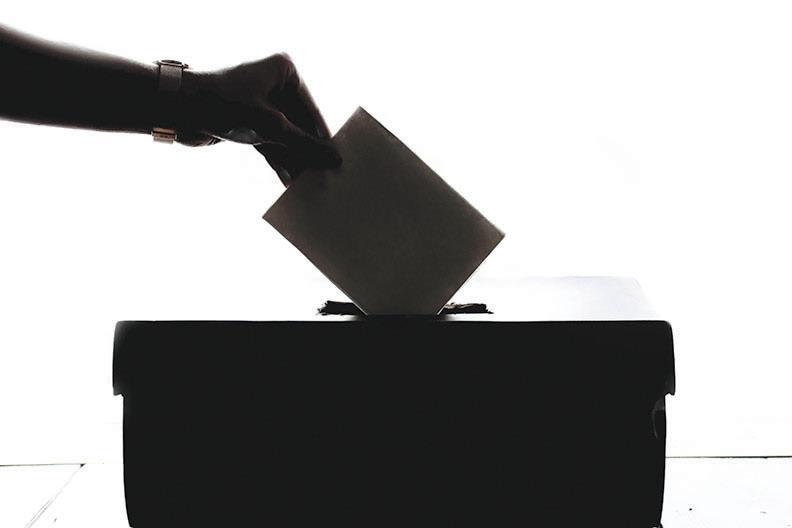
struck down. Trying to go to college?
for a new firm? A federal appeals court in Georgia ruled that a venture capital fund for Black women called the Fearless Fund can no longer focus on helping Black women. Both judges who voted against Black women in the 2-1 decision were appointed by Donald Trump.
Need help on the farm?
The U.S. Supreme Court ruled 6-3 last year that colleges and universities can no longer use race in admissions to create a more diverse student body.
affirmative action were appointed by Republican presidents. The three Democratic-appointed justices dissented.
“While we’re busy scrolling through social media every day, hundreds of decisions are happening in courtrooms all around the country that affect our lives.”
Struggling to pay your student loans? The Supreme Court killed student loan debt relief that would have helped 40 million Americans. Once again, all six justices were Republican appointees.
Need to have an abortion? The Supreme Court ruled two years ago that women no longer have reproductive rights to control their own bodies. All six justices who overturned Roe v. Wade were Republican appointees.
Did you fall behind on your rent during the pandemic? The Supreme Court ended the nationwide eviction moratorium that protected millions of American
All six justices who killed
renters from being kicked out of their apartments.
Once again, a 6-3 Republican decision.
Want to vote for a Black member of Congress? The Supreme Court ruled that Republicans can use a racially gerrymandered voting map that disenfranchised Black voters in South Carolina. But all six Republicanappointed justices allowed the map.
And it’s not just the Supreme Court.
Looking to launch a Black business? A federal judge in Texas ruled that the Minority Business Development Agency, a 55-year-old agency, is now illegal because it discriminates against White people. Once again, the judge was appointed by Donald Trump.
Need startup money
A federal judge in Florida stopped President Biden’s debt relief program that helped Black farmers because it was unfair to White farmers. The judge was appointed by Republican President George Bush, exposing the influence of conservative jurists appointed years ago.
Then, just a few days ago, a Trump-appointed federal judge in Texas wouldn’t even allow emergency disaster assistance for Black farmers because it was unfair to White men.
Republican-appointed judges in the state courts are just as dangerous for Black people.
Want to wear your natural hair? A Texas judge ruled that a school district could force high school student Darryl George to cut his locs, despite the state’s CROWN Act that prohibits hairstyle discrimination. The judge ran as a Republican.
Want to protest racism? A Missouri judge just expunged the records of the infamous St. Louis couple who previously pleaded guilty
to assaulting Black Lives Matter protesters with guns. The judge was appointed by Missouri’s Republican governor. Elections have consequences. President Biden appointed the first Black woman on the U.S. Supreme Court and appointed more Black judges in his first 1,000 days than any president in history. In fact, he appointed more Black judges than the last four Republican presidents combined. Trump, on the other hand, was the first president since Richard Nixon 50 years ago to appoint no Black judges to the U.S. Courts of Appeals. Give him another four years, and it’s all over for us.
While we’re busy scrolling through social media every day, hundreds of decisions are happening in courtrooms all around the country that affect our lives. By not voting, you’re not helping Black people or promoting the progressive cause. You’re consigning your children to live under a legal regime governed by antiBlack Republican judges for years to come.
This article was originally published by Word In Black. “Black Vote, Black Power,” a collaboration between Keith Boykin and Word In Black, examines the issues, the candidates and what’s at stake for Black America in the 2024 presidential election.
The U.S. Supreme Court unanimously voted on June 13 to dismiss a challenge to mifepristone, an abortion pill, saying opponents lack standing to contest the Food and Drug Administration’s (FDA) actions concerning the drug.
“Today’s decision does not change the fact that the fight for reproductive freedom continues. It does not change the fact that the Supreme Court overturned Roe v. Wade two years ago, and women lost a fundamental freedom,” said President Joe Biden (D) in a statement. “It does mean that mifepristone, or medication abortion, remains available and approved.”
The FDA approved mifepristone in September 2000 to be used for terminating a pregnancy up to seven weeks gestation, according to the FDA’s website. In 2016, they
approved its use for up to 10 weeks.
Democratic nominee for U.S. Senate Angela Alsobrooks (D-Md.), who has been vocal about protecting abortion rights in Congress, commented on the decision.
“It was correct that the
Supreme Court made the decision to keep this single right intact – women’s access to this particular reproductive medication,” said Alsobrooks in a statement. “But I, like so many women across this country, shouldn’t have to wait with bated
breath to see if justices will allow us to make our own health care decisions. I shouldn’t have to fear for our daughters’ and granddaughters’ futures in this country.”
With the overturning of Roe v. Wade in 2022, abortion access has

become a top issue for one in eight voters or 12 percent, according to a health-tracking poll by KFF (Kaiser Family
“Today’s decision does not change the fact that the fight for reproductive freedom continues.”
Foundation), a health policy organization. About half of voters polled say they believe the upcoming presidential, congressional and state-level elections will have a “major impact” on abortion access.
For that reason, the decision has drawn a range of responses.
“I have both relief and anger about this decision. Thank goodness
the Supreme Court unanimously rejected this unwarranted attempt to curtail access to medication abortion, but the fact remains that this meritless case should never have gotten this far,” said Nancy Northup, president and CEO of the Center for Reproductive Rights, in a statement shortly after the decision. “In the end, this ruling is not a ‘win’ for abortion—it just maintains the status quo, which is a dire public health crisis in which 14 states have criminalized abortion.”
According to the Center for Reproductive Rights, the 14 states that have made abortion illegal include Arkansas, Idaho, Texas and West Virginia.
“While we’re disappointed with the court’s decision, we will continue to advocate for women,” said Erin Hawley, a senior counsel for Alliance Defending Freedom, a conservative legal advocacy group, in a statement.

The Office of the Deputy Mayor for Planning and Economic Development (DMPED) researched the fiscal and community impact of sports and entertainment venues in the District with a new report, released on June 13. The report included an analysis of major sports teams potentially relocating to the District, while also including the economic impact that sports and entertainment facilities have had in the city as of date.
The report showed that major sports have generated significant revenue for the city, including a total of $5 billion in 2022. In 2023, nearly 7.5 million people traveled to the District to watch a major sporting event and 88 percent were non-District residents. Thirty-four percent of visitors travel from Virginia, 30 percent travel from Maryland and an impressive 24 percent of fans travel from outside of the DMV.
“D.C. is the sports capital. We know how important sports are to our city’s economy and
culture,” said Mayor Muriel Bowser in a press release. “They create jobs, generate
“They create jobs, generate tax revenue and spur economic development. Sports also create a lot of pride in our city, they bring people together and we look forward to continuing to support our teams in ways that benefit our city...”
tax revenue and spur economic development.
Sports also create a lot of pride in our city, they bring people together and we look forward to continuing to support our teams in ways that benefit our city and residents and help knock D.C.’s comeback out of the park.”
The venues included in the report are Capital

A
One Arena, Audi Field, Nationals Park and the Entertainment and Sports Arena. Capital One Arena is home to the National Basketball Association Washington Wizards and the National Hockey League Washington Capitals. Major League Soccer’s DC United play at Audi Field. The Women’s National Basketball Association Washington
Mystics play games both at the Entertainment and Sports Arena as well as Capital One Arena. Audi Field is also home to the annual Truth and Service Classic, a rivalry game between the city’s own Howard Bison and the Hampton Pirates. The report also showed that sport outings increase metrorail ridership. Gallery Place station, close to Capital
One, has the second highest daily ridership in the city, second only to Union Station. A poll showed that 76 percent of D.C. residents would support a Washington Commanders relocation to the city. The Commanders used to call Robert F. Kennedy (RFK) Memorial Stadium home but they now play at Commanders
Field in Prince George’s County, Md. Hosting a National Football League franchise is projected to produce over $1.25 billion in economic revenue, $25 million in tax revenue, $289.8 million in labor income and create 2,095 jobs. The last professional team to play in RFK Stadium was DC United in 2019.
AFRO Sports Intern mabbott@afro.com
Gervonta “Tank” Davis remains undefeated and will maintain his World Boxing Association (WBA) lightweight title after defeating Frank Martin via an eighth round knockout at MGM Grand Garden Arena in Las Vegas. The June 15 bout between the two fighters handed Martin the first loss of his career.
This was Davis’ first fight in nearly 14 months, where he defeated Ryan Garcia in a catchweight bout via knockout.
“[I was] just a little rusty, but it’s okay. I’m back!” said Davis in a post-fight interview with Emmy Award-winning and International Boxing Hall of Fame sportscaster, Jim Gray. “In the first couple of rounds, I feel like I hadn’t warmed up completely…I got more comfortable as the rounds were going on.”
Both fighters
acknowledged their opponents’ boxing skills. Davis gave Martin credit for his “decent” jab that noticeably bruised the Baltimore native’s face. Martin was leading the fight during the first three rounds. Davis also said that Martin is a great fighter overall.
“[Tank] is a slick
guy. He can box, he can punch. I feel like Tank can adapt to a lot of different styles. He’s experienced,” said Martin, during his postfight press conference. Davis was able to catch Martin with an uppercut in the eighth round which stunned the 29-year-old boxer,
leading to the knockout blow that Davis delivered which ended the fight. Martin admitted that he did not see the uppercut coming.
“He does a great job at landing his big shot. He knows how to land that shot, hit guys on the button, and just get guys out of there because he

is an accurate puncher,” said Martin during his press conference in reference to Davis’ power.
Prior to the knockout, Davis was ahead 6766 on all three of the judge’s scorecards. One of the first people to congratulate Davis after his victory was Garcia.
Garcia was donned in a shirt that read “Tank’s Number 1 Fan” on the front and “Rematch Me” on the back. Garcia told Davis that he is the best fighter from 135-140 lbs in the world right now.
With the victory, Davis improves to 30-0 in his career. The lightweight superstar continues to dominate his opponents in the ladder rounds, with 28 of his 30 victories coming via knockout.
Although Davis is aware that the good vibes must be short lived, he made sure to acknowledge the magnitude of the event he participated in.
“It’s very special to me. I wish I could have
taken pictures with all of the legends that came out today. I feel like I solidified my spot [in the boxing world], but I am definitely appreciative of everything and nothing goes unnoticed,” said Davis during his postfight press conference.
The night was a quite historic one for the MGM Grand Garden Arena, as it was a landmark 100th championship fight night at the arena. MGM Grand Garden has seen the likes of Mike Tyson, Muhammad Ali, Evander Holyfield and Floyd “Money” Mayweather Jr. In the future, Davis said he is open to fighting two-time Olympic gold medallist Vasyl Lomachenko and Shakur Stevenson. Notable attendees at the 100th championship fight night were Heisman champion and Washington Commanders 2024 first overall pick Jayden Daniels and National Basketball Association All-Star Damien Lillard.
As summer kicks into high gear, the D.C, Maryland and Virginia area is quickly becoming the place to be for fun in the sun. This week, the AFRO compiled a mixture of events that will range from festivals, museum happenings, panel discussions and bike tours. Take a look at the events below to find something that piques your interest and don’t forget to register!
The National Great Blacks in Wax Museum’s 8th Annual “Voices of History” Street Fair
The National Great Blacks in Wax Museum, Discover Me, Recover Me and T.E.A.C.H will be hosting a free community event to celebrate Black history, culture and community. Music and live performances will be featured, along with local talent, vendors, art, food and more.
Date: July 13
Location: The National Great Blacks in Wax Museum 1601-1649 East North Avenue Baltimore, MD 21213
Time: 11 a.m – 6 p.m
U.S. Africa Collaborative
The Pan African City Exposition, which is hosted by Bowie State University and sponsored by Wells Fargo, will host a series of events to educate people of sustainability and urban development. The event will have plenary sessions with speakers such as Dr. Ernest Khalema, Ph.D, Maria Day Marshall Esq., Dr. Sijekula Mbanga, Ph.D and CEO of York Housing Authority Regina Stone Mitchell.
Date: June 26-29
Time: Sessions are on June 26, June 27 and June 28 are from 10:45 a.m - 5:15 p.m. and June 29 from 10:45 a.m - 5:30 p.m. See schedule for more details.
Location: Bowie State University National Sciences Building and Student Center 14000 Jericho Park Rd, Bowie, MD, USA.
Cost: Free, (registration link): https:// usafricacollaborative.org/registration/
NoMa BID: Sunset Concert Series
NoMa BID and DC Fray are hosting a Sunset Concert Series to celebrate a diverse culmination of artists and

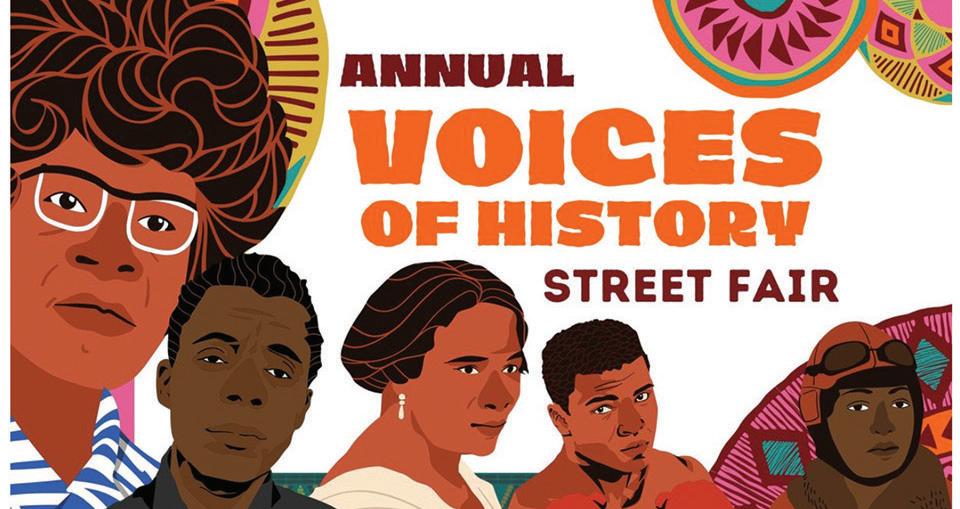
Free events are happening in the D.C., Maryland and Virginia area all summer, bringing fun for the whole
In Baltimore, the National Great Blacks in Wax Museum’s 8th Annual
13 from 11 a.m to 6 p.m in the 1600 block of East North
music ranging from go-go, funk, indie and more. There will be vendors and food trucks.
Date: June 11 to July 30
Time: 6:30 p.m - 8:30 p.m
Location: Alethia Tanner Park 227 Harry Thomas Way Northeast Washington D.C. 20002
Cost: Free, RSVP on Eventbrite
W.E.B Du Bois Ethiopianism and Black Internationalism | Busboys and Poets Books
Busboys and Poets will host a discussion with Dr. Wayne A. Rose. He is speaking, along with Professor Robbie Shilliam, to discuss his research on W.E.B. Du Bois and Black internationalism.
Date: June 30
Location: Busboys and Poets (Takoma) 235 Carroll Ave NW Washington, DC 20012
Time: 6 p.m - 8 p.m
Cost: Free, RSVP on Eventbrite
A Night of Worship And Prayer
Worship leader and composer John Bolin and the Voices of Praise Choir are hosting “A Night of Worship and Prayer.” This live event features uplifting music, heartfelt prayers, and spiritual reflection of the Museum of the Bible.
Date: July 3 – 6
Time: Doors open at 5:15 p.m and event starts at 6 p.m
Location: World Stage Theatre 400 4th Street Southwest Washington, DC 20024
Cost: Free, RSVP on Eventbrite
Subversive, Skilled, Sublime: Fiber Art by Women
Visual artist Mary Savig and Curator of Craft Lloyd Herman are hosting the virtual Subversive, Skilled, Sublime: Fiber Art by Women Lecture. This event will immerse listeners in discussions about art by women at SAAM’s Renwick Gallery.
Date: July 11
Location: Zoom
Time: 7 p.m - 8 p.m
Cost: Free, (registration link): https://americanart. si.edu/exhibitions/fiber-art-by-women
Housing and Urban Development Disabled Veteran Owned Small Business Event
The U.S. Department of Housing and Urban Development (HUD) Office of Small and Disadvantaged Business Utilization (OSDBU) is hosting the 17th Annual Service-Disabled VeteranOwned (SDVOSB) event at the HUD headquarters
of
building. This event will provide businesses with information about the laws, rules and regulations that govern SDVOSB.
Date: July 11
Time: 10 a.m -1 p.m
Location: U.S. Department of Housing and Urban Development 451 7th Street Southwest Washington, DC 20410
Cost: Free, RSVP on Eventbrite
Hill Family Biking- Yards Park Ride
A network called Hill Family Biking is organizing a four-mile bike ride around Capitol Hill and adjacent regions of D.C. Free Ice Cream will be provided to 200 ride participants starting with kids. Families are encouraged to be 15 minutes early if their bikes need maintenance. The police bike team will be in attendance.
Date: July 20
Time: 4 p.m - 5:30 p.m EDT
Location: Payne Elementary 1445 C Street Southeast Washington D.C, 20003
Entrances on 14th and D
Cost: Free, RSVP on Eventbrite
Annual Voter Registration Training
The League of Women Voters of Arlington is holding an annual voter registration training event.
Date: July 14
Location: Unitarian Universalist Church (The Activity Room) 4444 Arlington Boulevard Arlington, VA 22204
Time: 2:30 p.m - 4 p.m
Cost: Free, RSVP on Eventbrite
Black Pride RVA - Day of Purpose Festival
The Greater Richmond Convention center will be hosting a “Day of Purpose Festival.” This event will focus on the strength and diversity of the BIPOC LGBTQIA+ community. The attendees can enjoy live musical performances, art exhibits and various vendors.
Date: July 20
Location: Greater Richmond Convention Center 403 North 3rd Street Richmond, VA 23219
Time: 11 a.m - 4 p.m
Cost: Free, RSVP on Eventbrite

SUPERIOR COURT OF THE DISTRICT OF COLUMBIA PROBATE DIVISION ADMINISTRATION NO. 2024ADM610 MICHAEL JOSEPH REED Name of Decedent Notice of Appointment, Notice to Creditors and Notice to Unknown Heirs
MARY DIANE FIELDS REED, whose address is 1790
SYCAMORE STREET NW WASHINGTON, DC 20012 was appointed Personal Representative of the estate of MICHAEL JOSEPH REED, who died on JANUARY 15, 2024 with a Will and will serve without Court supervision. All unknown heirs and heirs whose whereabouts are unknown shall enter their appearance In this proceeding. Objections to such, appointment shall be filed With the Register of Wills, D.C., Building A, 515 5th Street, N.W., 3rd Floor, Washington, D.C. 20001, on or before DECEMBER 14, 2024. Claims against the decedent shall be presented to the undersigned with a copy to the Register of Wills or filed with the Register of Wills with a copy to the undersigned, on or before DECEMBER 14, 2024 or be forever barred. Persons believed to be heirs or legatees of the decedent who do not receive a copy of this notice by mail within 25 days of its publication shall so inform the Register of Wills, including name, address and relationship. Date of first publication: JUNE 14, 2024 Name of newspaper and/or periodical: Daily Washington Law Reporter AFRO American Newspapers
MARY DIANE FIELDS REED Personal Representative TRUE TEST COPY REGISTER OF WILLS 6/14, 6/21, 6/28/24
SUPERIOR COURT OF THE DISTRICT OF COLUMBIA PROBATE DIVISION ADMINISTRATION NO. 2024ADM000638
RUBY ERNESTINE GRAY AKA RUBY ERNESTINE HORNE GRAY Name of Decedent Notice of Appointment, Notice to Creditors and Notice to Unknown Heirs BYRON KEITH GRAY, whose address is 11 QUINCY PLACE NE WASHINGTON DC 20002 was appointed Personal Representative of the estate of RUBY ERNESTINE GRAY AKA RUBY ERNESTINE HORNE GRAY, who died on FEBRUARY 23, 2024 without a Will and will serve without Court supervision. All unknown heirs and heirs whose whereabouts are unknown shall enter their appearance In this proceeding. Objections to such, appointment shall be filed With the Register of Wills, D.C., Building A, 515 5th Street, N.W., 3rd Floor, Washington, D.C. 20001, on or before DECEMBER 14, 2024. Claims against the decedent shall be presented to the undersigned with a copy to the Register of Wills or filed with the Register of Wills with a copy to the undersigned, on or before DECEMBER 14, 2024 or be forever barred. Persons believed to be heirs or legatees of the decedent who do not receive a copy of this notice by mail within 25 days of its publication shall so inform the Register of Wills, including name, address and relationship.
Date of first publication: JUNE 14, 2024 Name of newspaper and/or periodical: Daily Washington Law Reporter AFRO American Newspapers
BYRON KEITH GRAY Personal Representative
TRUE TEST COPY REGISTER OF WILLS 6/14, 6/21, 6/28/24
ETHEL R. ANDERSON AKA ETHEL ROBINSON ANDERSON AKA ETHEL REBECCA ROBINSON Name of Decedent DONALD M. TEMPLE, ESQ. 2522-A VIRGINIA AVE., NW WASHINGTON DC 20005 Notice of
SUPERIOR COURT OF THE DISTRICT OF COLUMBIA PROBATE DIVISION ADMINISTRATION NO. 2024ADM000681
ELIZABETH MARTIN SMITH Name of Decedent Notice of Appointment, Notice to Creditors and Notice to Unknown Heirs
DAVIE E. SMITH JR., whose address is 1332 RANDOLPH ST., NW WASHINGTON, DC 20011 was appointed Personal Representative of the estate of ELIZABETH MARTIN SMITH, who died on JULY 14, 2023 with a Will and will serve without Court supervision. All unknown heirs and heirs whose whereabouts are unknown shall enter their appearance In this proceeding.
Objections to such, appointment shall be filed With the Register of Wills, D.C., Building A, 515 5th Street, N.W., 3rd Floor, Washington, D.C. 20001, on or before DECEMBER 21, 2024. Claims against the decedent shall be presented to the undersigned with a copy to the Register of Wills or filed with the Register of Wills with a copy to the undersigned, on or before DECEMBER 21, 2024 or be forever barred. Persons believed to be heirs or legatees of the decedent who do not receive a copy of this notice by mail within 25 days of its publication shall so inform the Register of Wills, including name, address and relationship. Date of first publication: JUNE 21, 2024 Name of newspaper and/or periodical: Daily Washington Law Reporter AFRO American Newspapers DAVIE E. SMITH JR. Personal Representative TRUE TEST COPY REGISTER OF WILLS 6/21, 6/28, 7/05/24
SUPERIOR COURT OF THE DISTRICT OF COLUMBIA PROBATE DIVISION ADMINISTRATION NO. 2024ADM000701 JANIE M. MOORE Name of Decedent
THOMAS L. CAMPBELL, ESQUIRE 3807 MINNESOTA AVENUE, N.E WASHINGTON, DC 20019-2660 Notice of Appointment, Notice to Creditors and Notice to Unknown Heirs
HARVEY R. MOORE AND CLAUDIA M. PAYNE, whose addresses are 3312 RANDALL ROAD SUITLAND MD 20746 AND 4928-12TH STREET NE WASHINGTON DC 20002 were appointed Personal Representative of the estate of JANIE M.MOORE, who died on SEPTEMBER 21, 2016 with a Will and will serve without Court supervision. All unknown heirs and heirs whose whereabouts are unknown shall enter their appearance In this



Sonication No.: CAP24000396
– Tanyard Springs Park Development
Contact: Kathryn Garafola – 443-336-4648
BOARD OF LIQUOR LICENSE COMMISSIONERS FOR BALTIMORE CITY NOTICE—SPECIAL AD – JUNE 17, 2024
Petitions have been filed by the following applicants for licenses to sell alcoholic beverages at the premises set opposite their respective names. The real property for these applications will be posted on or about June 17, 2024. Written protests concerning any application will be accepted until and including the time of the hearing. Public hearings may be scheduled on or after June 27, 2024 at 10:30 AM in City Hall; 100 N. Holliday Street, Room 215, Baltimore, Maryland 21202. Please visit llb.baltimorecity.gov under the link for "Hearing Schedules for confirmation of the

Payment Policy for legal notice advertisements.
Effective immediately, The Afro American Newspapers will require prepayment for publication of all legal notices
Payment will be accepted in the form of checks, credit card or money order. Any returned checks will be subject to a $25.00 processing fee and may result in the suspension of any future advertising at our discretion.
CERTIFICATION OF PUBLICATION
CITY OF BALTIMORE
OFFICE OF BOARDS AND COMMISSIONS
PUBLIC NOTICE REQUEST FOR PROPOSAL - PROJECT NO. 1400
CERTIFICATION OF PUBLICATION CITY OF BALTIMORE OFFICE OF BOARDS AND COMMISSIONS PUBLIC NOTICE
REQUEST FOR PROPOSAL - PROJECT NO. 1400
PROJECT #1400 – On Call Project and Construction Management Assis-
PROJECT #1400 – On Call Project and Construction Management Assistance The City of Baltimore Office of Engineering and Construction (OEC) has been authorized to request the Office of Boards and Commissions (OBC) to advertise Project 1400 for the selected services. Six (6) contracts will be awarded for a period of four years each.
tance The City of Baltimore Office of Engineering and Construction (OEC) has been authorized to request the Office of Boards and Commissions (OBC) to advertise Project 1400 for the selected services. Six (6) contracts will be awarded for a period of four years each.
It is the expectation of the City’s that interested firms providing these services must demonstrate and document the following:SCOPE OF WORK The services to be provided include, but are not limited to assisting the Construction Management section with construction monitoring and inspection, preparation of daily reports, maintenance of project records and documentation, review of contractor’s application for payment, attendance at progress meetings, preparation of record drawings, review of contract claims and supporting documents, estimating, scheduling, project engineering, constructability reviews, submittal reviews and respons RFI reviews and responses, and construction contract administrative support. Depending on the nature of other work and City staff requirements, personnel representing the selected firm shall be available on an as needed basis.
It is the expectation of the City’s that interested firms providing these services must demonstrate and document the following:SCOPE OF WORK
The services to be provided include, but are not limited to assisting the City Construction Management section with construction monitoring and inspection, preparation of daily reports, maintenance of project records and documentation, review of contractor’s application for payment, attendance at progress meetings, preparation of record drawings, review of contract claims and supporting documents, estimating, scheduling, project engineering, constructability reviews, submittal reviews and responses, RFI reviews and responses, and construction contract administrative support. Depending on the nature of other work and City staff requirements, personnel representing the selected firm shall be available on an as needed basis.
* Familiarity with standard construction inspection procedures and requirements for civil, mechanical, and electrical disciplines.
* Familiarity with standard construction inspection procedures and requirements for civil, mechanical, and electrical disciplines.
* Familiarity with applicable codes and standards.
* Familiarity with applicable codes and standards.
* Experience with change orders and claims analysis.
Experience with change orders and claims analysis. Ability to supplement the city staff to provide field inspection and supervision.
* Ability to supplement the city staff to provide field inspection and supervision.
* Experience with Critical Path Method construction scheduling, delay analysis and P6 Software.
* Experience with Critical Path Method construction scheduling, delay analysis and P6 Software.
* Overall team approach with Minority/Women Business Enterprises.
* Overall team approach with Minority/Women Business Enterprises. Experience with Primavera Contract Management version 14 (CM14) and/or Oracle Unifier project tracking software and Oracle P6 scheduling software Consultant’s team will provide engineering staff with the following capabilities;
* Experience with Primavera Contract Management version 14 (CM14) and/or Oracle Unifier project tracking software and Oracle P6 scheduling software Consultant’s team will provide engineering staff with the following capabilities;
* Personnel with skills equivalent to a Public Works Inspector I, including a minimum education level of a high school diploma or GED and three (3) years of experience performing construction inspection work. Proficient with Primavera CM14 and/or Oracle Unifier
* Personnel with skills equivalent to a Public Works Inspector I, including a minimum education level of a high school diploma or GED and three (3) years of experience performing construction inspection work. Proficient with Primavera CM14 and/or Oracle Unifier
* Personnel with skills equivalent to a Public Works Inspector II, including a minimum education level of a high school diploma or GED and four (4) years of experience performing construction inspection work on water and sewer system facilities and utilities. Proficient with Primavera CM14 and/or Oracle Unifier.
* Personnel with skills equivalent to a Public Works Inspector II, including a minimum education level of a high school diploma or GED and four (4) years of experience performing construction inspection work on water and sewer system facilities and utilities. Proficient with Primavera CM14 and/or Oracle Unifier.
* Personnel with skills equivalent to a Public Works Inspector III, including a minimum education level of a high school diploma or GED and five (5) years of experience performing construction inspection work on water and sewer system facilities. and utilities. Proficient with Primavera CM14 and/or Oracle Unifier.
* Personnel with skills equivalent to a Public Works Inspector III, including a minimum education level of a high school diploma or GED and five (5) years of experience performing construction inspection work on water and sewer system facilities. and utilities. Proficient with Primavera CM14 and/or Oracle Unifier.
* Personnel with skills equivalent to an Engineer II, including a Bachelor of Science degree in engineering from an accredited college or university and four (4) years of experience in performing engineering work.
* Personnel with skills equivalent to an Engineer II, including a Bachelor of Science degree in engineering from an accredited college or university and four (4) years of experience in performing engineering work.
* Personnel with skills equivalent to an Engineer I, including a Bachelor of Science degree in engineering from an accredited college or university.
* Personnel with skills equivalent to an Engineer I, including a Bachelor of Science degree in engineering from an accredited college or university.
* Personnel with skills equivalent to a public works Construction Project Supervisor I, including a minimum education level of a bachelor’s degree from an accredited college or university and three (3) years in construction inspection, construction supervision, and construction engineering on water and sewer system facilities and utilities. Proficient with Primavera CM14 and/or Oracle Unifier.
* Personnel with skills equivalent to a public works Construction Project Supervisor I, including a minimum education level of a bachelor’s degree from an accredited college or university and three (3) years in construction inspection, construction supervision, and construction engineering on water and sewer system facilities and utilities. Proficient with Primavera CM14 and/or Oracle Unifier.
* Personnel with skills equivalent to a CPM Scheduler, including a college degree and at least five (5) years’ experience in construction or construction management, and a minimum of 2 years in
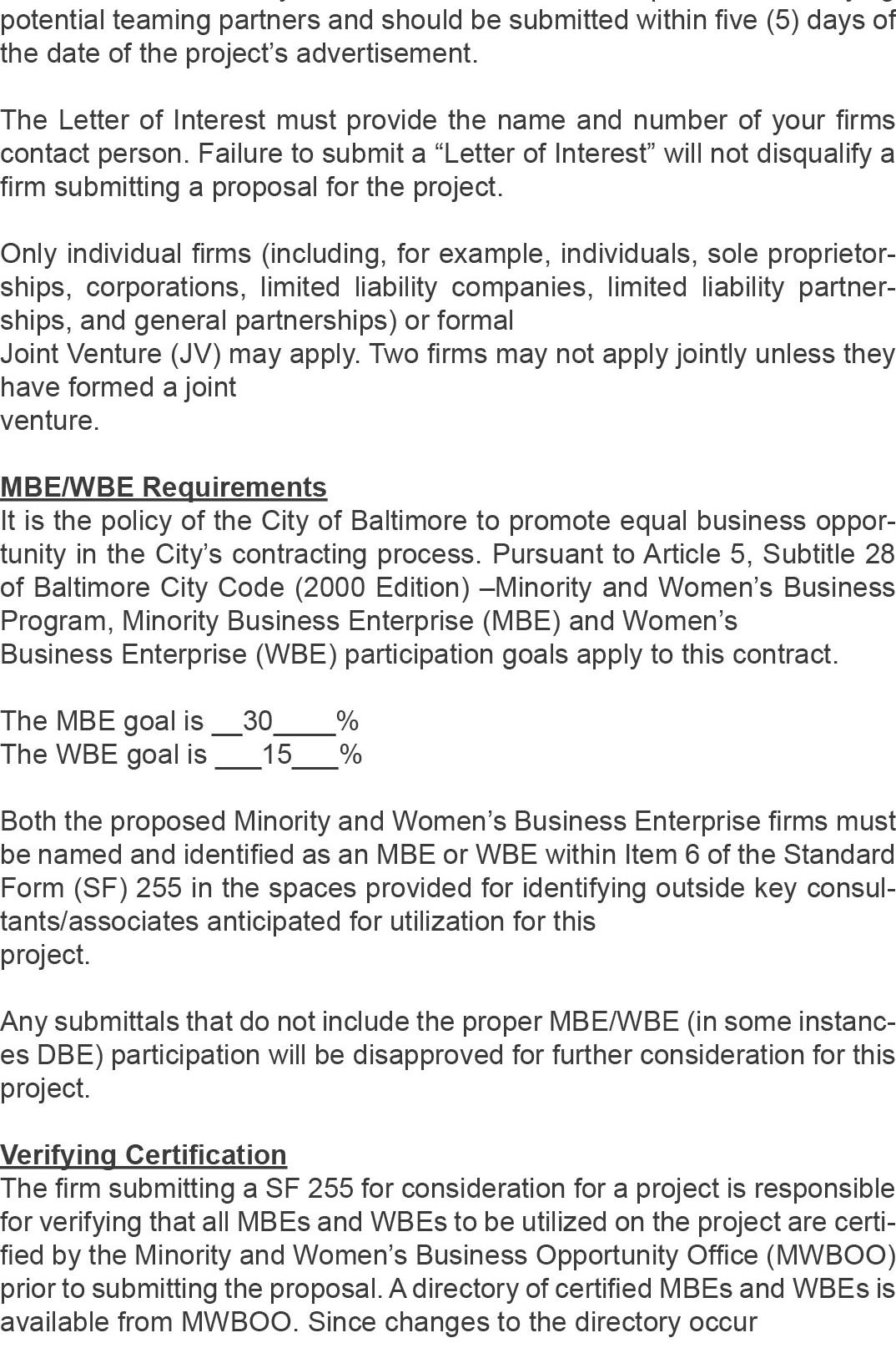
Applicant:
Applicant: AMA
Inc. T/a Bolton Hill Food Center - Mamisha Kuthu Pradham and George Henry Anderson Petition: Transfer of ownership Premises: 1111 Park Avenue 21201
2. CLASS “B” BEER & LIGHT WINE LICENSE
Applicant: Pono Taco One, LLC T/a Pono Taco - Scott R. Donnelly Petition: Transfer of ownership Premises: 529 E. Belvedere Avenue 21212
3. CLASS “B” BEER, WINE & LIQUOR LICENSE
Applicant: PubCo, LLC T/a Trade Name Pending - John Anthony Foreman Petition: New restaurant license requesting live entertainment and outdoor table service Premises: 1000 W. 36 th Street 21211
Applicant: Market 450, LLC T/a The Food Market - John Andrew Bedingfield and Chad Kurt Gauss, Sr. Petition: Transfer of ownership requesting outdoor table service, off-premises catering, and delivery of alcoholic beverages Premises: 1017 W. 36 th Street 21211
Applicant: IndoAmerican and Sushi Place, LLC T/a Trade Name Pending - Sudhir Vemuri and Jaclyn Miller Petition: Transfer of ownership with continuation of outdoor table service Premises: 938-40 S. Conkling Street 21224
Applicant: Meltor, Inc. T/a Mug Shots - Melvin T. Daniels and Gustavus Durr, Jr.
Petition: Transfer of ownership requesting live entertainment Premises: 31 E. Cross Street 21230
Applicant: Yebo Kitchen, LLC T/a Yebo Kitchen - Ashlee Denise Mack Petition: Transfer of ownership with continuation of outdoor table service, requesting delivery of alcoholic beverages Premises: 2219 Maryland Avenue 21218
Applicant: 2908 O’Donnell Street LL, LLC T/a Trade Name PendingAdam Christopher Wehr
Petition: Transfer of ownership with continuation of live entertainment and outdoor table service (Amended) Premises: 2908 O’Donnell Street 21224
4. CLASS “BD7” BEER, WINE & LIQUOR LICENSE
Applicant: Boston 2218, LLC T/a Trade Name Pending - Frank Xavier Petillo and Gilbert Lamont Collins, Jr.
Petition: Transfer of ownership and location of a Class “BD7” BWL license presently located at 801 Key Highway, Unit 2 to 2218 Boston Street requesting delivery of alcoholic beverages Premises: 2218 Boston Street 21231
Applicant: Gunther Retail, LLC T/a Trade Name Pending - David Westcott Wells Obrecht
Petition: Transfer of ownership and location of a Class “B” BWL license presently located at 3500 Boston Street to 3600 Boston Street, Suite 20 and to convert current Class “B” BWL li-
* Personnel with skills equivalent to a CPM Scheduler, including a college degree and at least five (5) years’ experience in construction or construction management, and a minimum of 2 years in
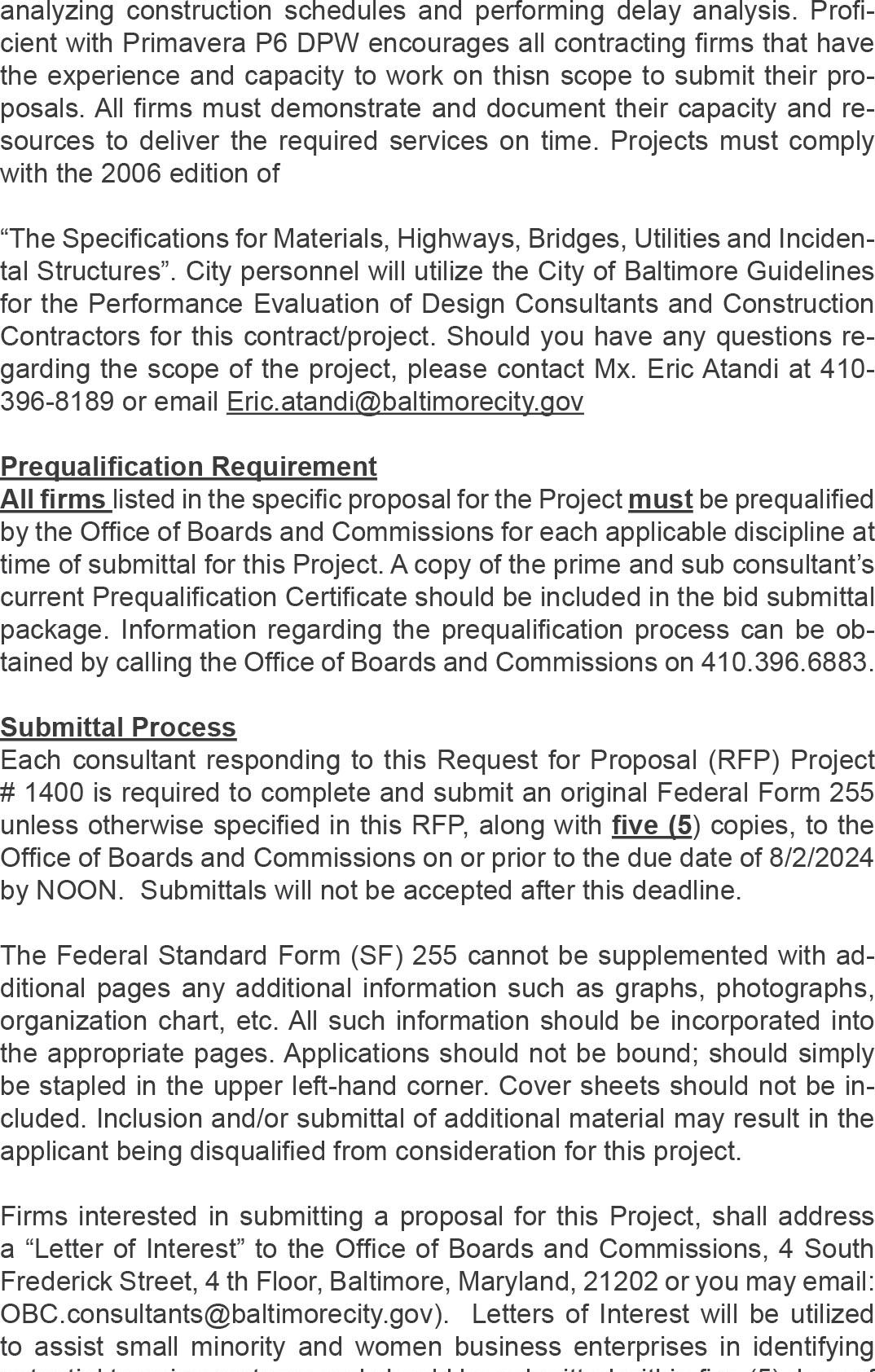



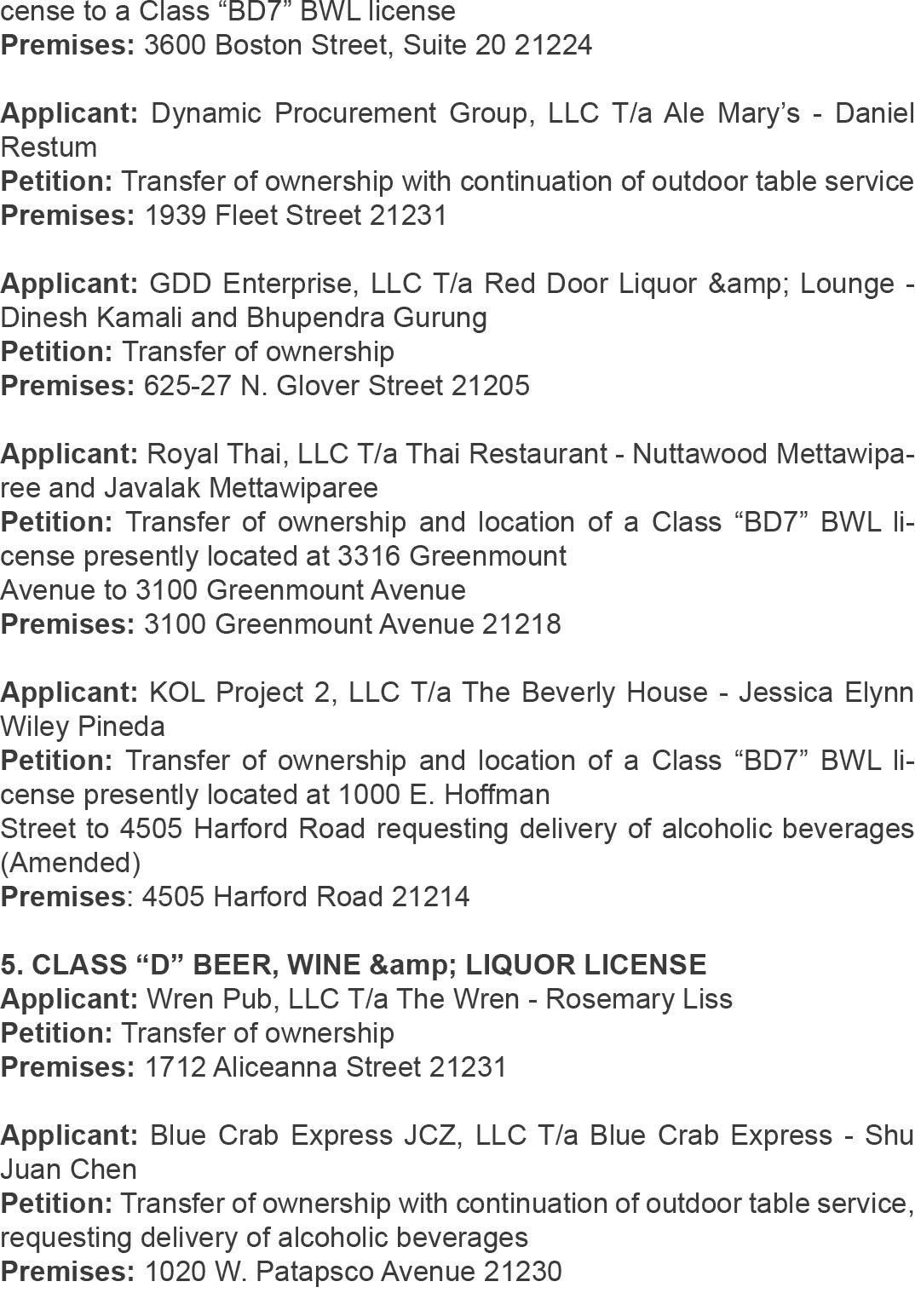
primary elections
By Ashlee Banks Special to the AFROabanks@afro.com
Washington D.C. voters flocked to the polls to cast ballots in the city’s primary elections on June 4.
President Joe Biden won the Democratic primary election and earned 87 percent of the vote, which comes as little surprise. However, former President Donald Trump, who is expected to be named the Republican party’s presidential
“It’s a good thing that the felon didn’t win.”
nominee next month, lost the primary election to former South Carolina Governor Nikki Haley.
Haley received 62.8 percent of the vote, while Trump secured only 33.3 percent. This came just days after the former Republican president was found guilty of 34 charges of falsifying business records.
“It’s a good thing that the felon didn’t win,” said U.S. Rep. Glenn Ivey, (DMd-4). “But, Nikki has had
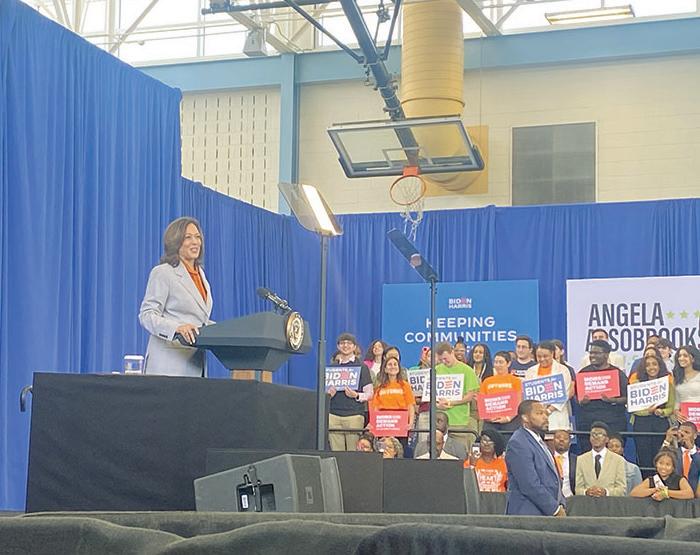 By Tashi McQueen AFRO Political Writer tmcqueen@afro.com
By Tashi McQueen AFRO Political Writer tmcqueen@afro.com
Community leaders came together in recognition of National Gun Violence Awareness Day on June 7 at the Kentland Community Center in Landover, Md. The event included remarks from the leaders such as Vice President Kamala Harris (D).
Throughout the gathering, antigun violence advocates emphasized that the leading cause of death for children and teens in the U.S. is guns, according to the Centers for Disease Control and Prevention. Speakers emphasized how crucial it is to vote in leaders that will support gun safety regulations on the federal level.
“Together, we can break the
cycle of gun violence and create a world where safety is a given– not a privilege– in every community,” said Isabella Socha Soares, social lead for the Students Demand Action, University of Maryland Chapter of Everytown for Gun Safety, a non-profit gun control advocacy organization.
“Students all over the country want to feel safe and not fear that they might go to school and not come home,” she continued. “I fight as a student not because I want to, but because I have to for students across the nation and for future generations.”
Democratic nominee for U.S. Senate, Angela Alsobrooks outlined what she would do as senator about crime and gun violence prevention.
“As a senator, I’ll stand for common sense approaches to make sure that firearms don’t end up in the hands of the wrong people, who can’t pass a background check,” she said.
“I won’t back down from holding gun manufacturers accountable.”
Aside from speaking on gun violence, the vice president used the event to also endorse Alsobrooks, who currently serves as Prince George’s County executive.
“I was so proud to support her when she was state’s attorney and to endorse her when she was county executive. Today, I proudly endorse Angela Alsobrooks for the United States Senate,” said Harris, amidst the cheers of the crowd. “She was
On Father’s Day, recognized this year on June 16, Hannah Rosenzweig, Jamal Holtz and Diane Robertson premiered their film “51st State.” The documentary was shown at the second annual D.C./DOX Film
Festival, a program that highlights projects capturing and cultivating life in the nation’s capital.
Rosenzweig created the film while Robertson served as the executive producer. The documentary follows statehood activists and D.C. natives Holtz and Demi Stratmon. Their work is housed under 51 for 51, an organization committed to D.C.’s statehood.
“We have to see D.C. statehood as a fight for racial justice,” Holtz told the AFRO. “There are people who are advocating around racial justice across the country, but we have to see D.C. statehood as an intersection to those issues.”
In 1787, the founding fathers decided that D.C. cannot have
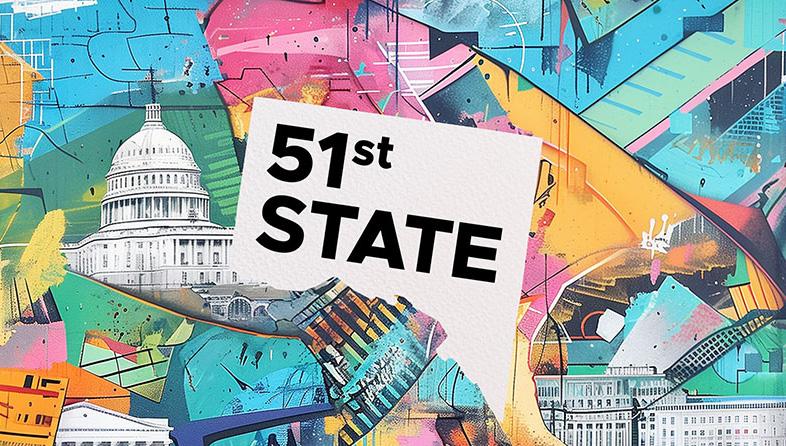
Although many children look forward to summer and the chance to get a break from school, there are some children and families who dread the close of the Spring semester. That’s because for many students living in underserved and impoverished communities, when the school days disappear– so do the meals. Areas like D.C.’s Ward 8 have limited access to fresh foods and many households are considered low-income. These factors, amongst several others, leave the community classified as a “food desert,” which leads students to grapple with summer hunger. To combat this, D.C. Mayor Muriel Bowser and the U.S Department of Agriculture (USDA) Summer Food Service Program (SFSP) are teaming up to present the D.C. Youth Meals Program. The program is aimed at combating hunger during the summer months and ensuring that youth in D.C. are able to receive meals and snacks with nutrients needed to learn, play and grow during the
congressional representation since the federal government is located there.
This set the precedence for the lack of political power and representation for D.C.’s 700,000 residents today. Though D.C. residents are America’s highest taxpayers, there is no Senate or State representation.
Historians argue that D.C.’s statehood is an issue of voter suppression and disfranchisement as Wyoming and Vermont, two states with lower populations than D.C., possess full political representation in the House and Senate.
“People don’t think about this as a voting rights issue, but it very much is,” George Derek Musgrove, an associate professor in University of Maryland Baltimore County’s department of history, said. “Our democracy, specifically in the Senate, gives more power to smaller, Whiter, redder states.”
United States House of Representative Eleanor Holmes Norton, a staple in the nation’s capital, serves as Congress’ only representation for the district.
“We don’t have any senators, the District of Columbia only has me on the House floor,” said Norton, who makes an appearance in the documentary. “The fight is really

Continued from D1
the first assistant state’s attorney in Prince George’s County, Md., to specialize in domestic violence cases. To be here to support her today is to know she will be an experienced leader on this issue.”
Gov. Wes Moore (D) and other top Maryland Democrats were present, supporting Alsobrooks and other Democratic nominees in this year’s general election.
“Today, tomorrow and all the way through November,
Continued from D1
we are going to ride with Angela Alsobrooks. We’re going to ride with the Biden-Harris Administration,” said Moore. “We have to have the right leaders in place who are going to fortify our future, who are going to actually use their time and their energy and their power to increase freedoms and not to decrease them.”
Republican nominee for U.S. Senate, former Governor Larry Hogan’s campaign responded to the event via X, a social media platform formerly known as Twitter.
some strange moments too. I read about her signing her name on bombs that were about to be dropped in [Gaza]. The Republican Party is in a strange place these days and I don’t know how they wander out of it.”
“I think it’s just another sign for Democrats to fight to take control of the House and maintain control of the Senate and the White House,” said the Maryland lawmaker.
U.S. Rep. Wesley Hunt, (R-Texas-38) says Hailey’s win is not a slight to Trump.
“We have our nominee,” said Hunt. “Trump’s the guy. It’s completely irrelevant to me.”
Despite Hailey’s victory, she announced in March that she would no longer run for president, therefore her primary win does not carry much weight.
Washington D.C. voters had their eyes set on another important primary race this week, U.S. Rep. Eleanor Holmes Norton (D-DC) battled it out with Kelly Mikel Williams. Norton defeated Williams, scoring 81 percent of the vote.
“The District of Columbia can have no greater advocate than delegate Eleanor Holmes Norton,” said U.S. Rep. Hank Johnson, (D-Ga-4) “She lives, breathes and bleeds Washington D.C. and what’s best for the people of this great [city].”
Ivey agreed with Johnson and believes that Holmes has been a staple in the D.C. community.
“She’s an institution. She’s been in Congress for a long time. I was still in school when she was first elected,” said Rep. Ivey. “The people of the district are fortunate to have her and we’re glad to have her in Congress.”
Norton will face Green Party nominee Kymone Freeman and Republican candidate Myrtle Alexander in November’s general election.
Continued from D1
The fight for D.C. statehood is done through three different legislative acts; For the People Act (H.R. 1), The Washington D.C. Admissions Act (S.51) and the John R. Lewis Voting Rights Advancement Act (H.R.4.). The bills did not pass during the 2021 legislative session.
inviting D.C. Mayor Muriel Bowser.
“We are always going to fight for D.C. statehood,” Bowser said, to the Young Democrats of D.C. “I am counting on you to take us to the next level.”
Robertson, Rosenzweig and Holtz participated in a panel after the documentary’s premiere.
of the need for statehood outside of the city,” Rosenzweig said. “That was a reason for somebody outside of the district like myself to make the film and hopefully bring it to new audiences. ”
“While Angela Alsobrooks is campaigning today, instead of just offering more platitudes, we urge her to tell voters how she will address the skyrocketing crime on her watch in Prince George’s County, Md.,” reads the statement. “Hogan has put forward a plan to address this out-of-control crime wave by funding law enforcement, taking repeat violent criminals off the streets and getting guns out of the hands of violent criminals and the mentally ill.”
In the shadow representative race, incumbent Oye Owolewa won the Democratic primary election and will face off against Republican challenger Ciprian Ivanof in November.
Voting rights attorney Ankit Jain won the democratic primary for shadow senator and is running unopposed in the general election this fall. A “shadow senator” is a senator recognized by Washington D.C., but not officially sworn in or seated by the U.S. Senate.
At-Large Member of the Council, Robert White won his seat against Democratic challenger Rodney Grant. White secured 83 percent of the vote and will not be challenged by a Republican candidate in the general election.
Ward 2 Councilwoman Brooke Pinto and Ward 4 Councilwoman Janeese Lewis George secured their seats during the primary election and will run unopposed in November.
Lastly, incumbent Trayon White won the Democratic primary for Ward 8 and will face off with Republican challenger Nate Derenge in November.
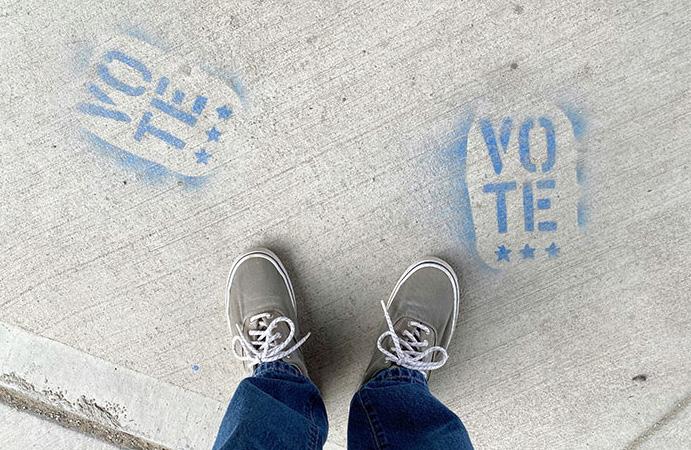
Continued from D1 about becoming equal to other Americans.”
The bills garnered the support of notable politicians such as the ACLU, U.S. Senator Cory Booker (D-NJ) and U.S. President Joe Biden.
“We have to push those individuals, especially those Democrats senators
“D.C.
Fawn Johnson, news director of the Bloomberg Industry Group, moderated the panel.
“As a historian and democracy advocate, I just saw this as the perfect story to tell,” Robertson said.
“D.C. is not going to become a state until the other 50 states decide that
is not going to become a state until the other 50 states decide that it should be a state– and that requires education– so this was the perfect vehicle to tell a story that would go beyond its intended audience and be used in places where people aren’t thinking about it.”
who have not yet spoken on D.C. statehood,” Stratmore said. “D.C. is a Black and Brown place, it’s easy to disenfranchise a group of people that have been disenfranchised for the entire history of this country.” Holtz and the 51 for 51 team vie for statehood in other avenues such as the Young Democrats of D.C.. Holtz becomes president of the respective organization,
it should be a state, and that requires education, so this was the perfect vehicle to tell a story that would go beyond its intended audience and be used in places where people aren’t thinking about it.”
The trio agreed that the film serves as a starting point for nationwide support of D.C. statehood.
“One of the things Jamal and I talked about was the importance of this story…
Visuals of the everyday Black Washingtonians enjoying their lives, even through their struggle for political representation, is a potential connection point for D.C.’s goals for statehood.
“Culture allows for connection,” Holtz said on authentic D.C. representation. “I go back to using the word ‘humanity.’ People get to connect with the human themes rather than the policy.”
Longtime statehood activist Henry Hughes said statehood efforts are intertwined with the roots of Black activism.
“This cycle is about self determination,” Hughes said.
If D.C. earns its statehood, it would be the first majority Black state in American history. This, Holtz says, could garner the support of Black communities who could empower their respective senators to support D.C. as the 51st state.
“There are Black people in South Carolina, in Texas, all over the country that have a connection to the Black culture displayed at an all-time high in Washington D.C.,” Holtz told the AFRO. “I think it’s important to showcase what D.C. is for other people to at least feel an immediate connection and familiarity…Black people across the country should be outraged that D.C. is not a state.”
Residents in the nation’s
are
that the 2024 primary race has been held.
The program will have over 100 sites throughout the city, with a goal of assisting as many youths as possible. The program is designed to serve youth 18 years old and younger, however there is no ID or application required to participate in the program. For over a decade, the D.C. Summer Meals Program has been serving the District residents, with more than 6.6 million summer meals provided to children throughout the city.
This year’s program is sponsored by Public and private local education agencies; Entities of state, local and municipal government; Public and private non-profit organizations with 501(c)(3) status and non-profit residential and non-residential camps. Sites will open and meals will become available starting June 26 and the program runs until August 25.
Some of the sites that will be serving meals to D.C.’s youth this summer include: Columbia Heights Early College; Bruce-Monroe Elementary School; School Without Walls High School; Banneker High School; Macfarland Middle School; John Lewis Elementary School; Blow Pierce Junior Academy; Tyler Elementary School; Seaton Elementary School; Woodson Collegiate; Bald Eagle Recreation Center; Anacostia High School; Kramer Middle School.

Inclusion and representation have become some of the most pressing concerns when it comes to the development and implementation of generative artificial intelligence (AI) technologies. AI tools function by learning
these tools and how they could benefit all,” said George. “We wanted to find a creative way to start the conversation and make people aware that there is an access gap in AI, which exists in the development side and in who sees themselves as participants in this new technology.”
The “What Prompted You” campaign uses AI to portray lived, human
“We’re trying to start a conversation within the industry that allows folks to question what access and inclusivity looks like within generative AI.”
from human data. If that data fails to include certain populations or those supervising it have prejudices themselves, bias and stereotypes can be perpetuated.
Marketing firm Creative Theory Agency, owned by Tamon George and Gary Williams Jr., recently launched an initiative calling for access and inclusion in AI-backed creative products.
“When we started to look at how we could infuse AI into our business to accelerate our creativity and what we, we came up against a couple walls. We didn’t see the right thoughtfulness and intentionality around the access and development of
experiences of local diverse creators. After interviewing members of the creative community, Williams and George took excerpts from their life stories and created prompts. They were then used to produce an AIgenerated image reflecting their experiences.
“It’s manifested into this huge, out-of-home campaign that we’re doing here in the city.
Right now, we have about a 100-foot wall covered with those stories,” said Williams. “It shows a portrait image captured by a photographer, an excerpt of their prompt and a generative AI image that represents their story.”
The images have become a mural in the
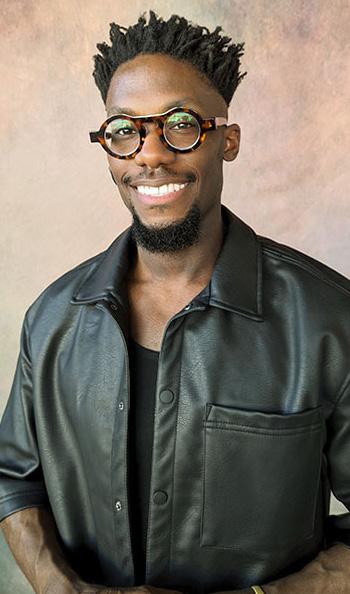
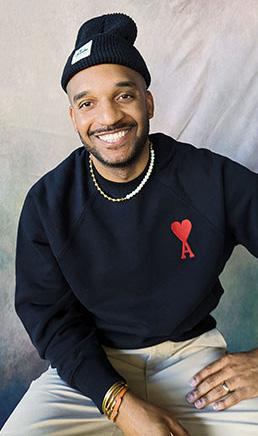
Union Market District. One of the featured creators is Janet Dorsey of Creative Ladder, a nonprofit working to expand access for Black and Brown people in advertising and marketing. Another is Keem Hughley who owns Bronze, a restaurant driven by Afrofuturism.
The campaign launched on May 28. Williams and George intend to continue collecting stories across the District and eventually take the initiative to other cities,
like New York and Los Angeles.
“We’re trying to start a conversation within the industry that allows folks to question what access and inclusivity looks like within generative AI. There’s a lot of mystery and fear around it right now from aspects like the loss of jobs to creatives feeling like there’s no need for them anymore,” said Williams. “We want folks to think intentionally about the technology and to learn
more about it.”
“As a creative myself, I want other creatives to understand that our expertise is still valuable in this new technology,” he continued.
Williams and George used Midjourney, an AIpowered creative platform, to generate the prompts and images for the campaign. They said the platform does not typically produce an accurate portrait on the first try.
It’s their expertise and
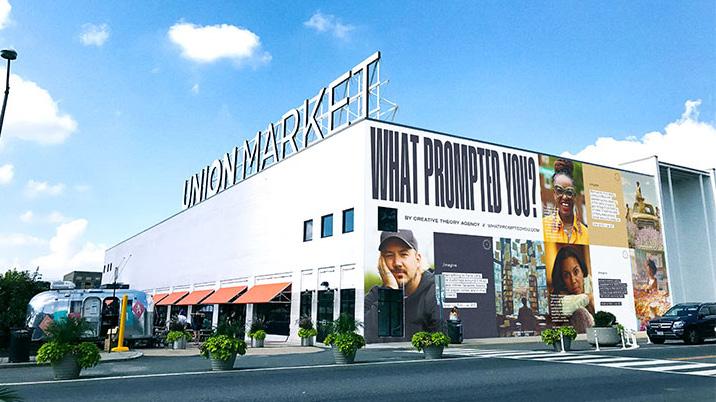
input that yields a refined, true representation of the creatives they feature.
“If I was just to put in, ‘woman in kitchen eating cereal’ the default is not going to be a Black woman with the nuance that we’re looking for. We’re not saying that every time we prompt it needs to be a person of color, but if I put the prompt in five times it shouldn’t give me all White women or White men every time,” said George.
“It’s about access for the folks who are building and feeding these machines and then testing and using them. Then, maybe it wouldn’t take us 100 iterations to get a nuanced image. Maybe it would only take us five if diverse perspectives are throughout


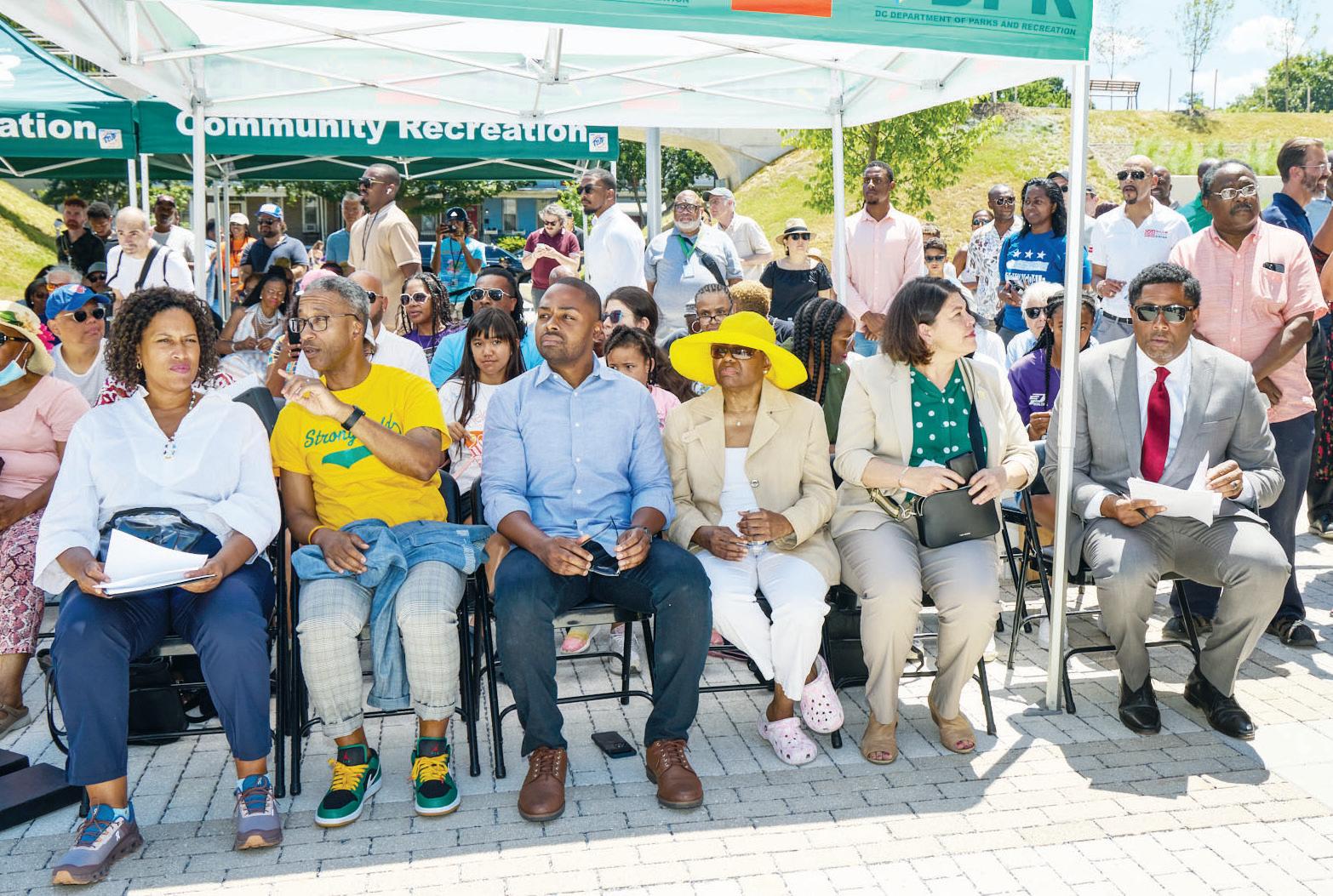
Muriel Bowser
cutting
Saturday, June 15, 2024
an aquatic center

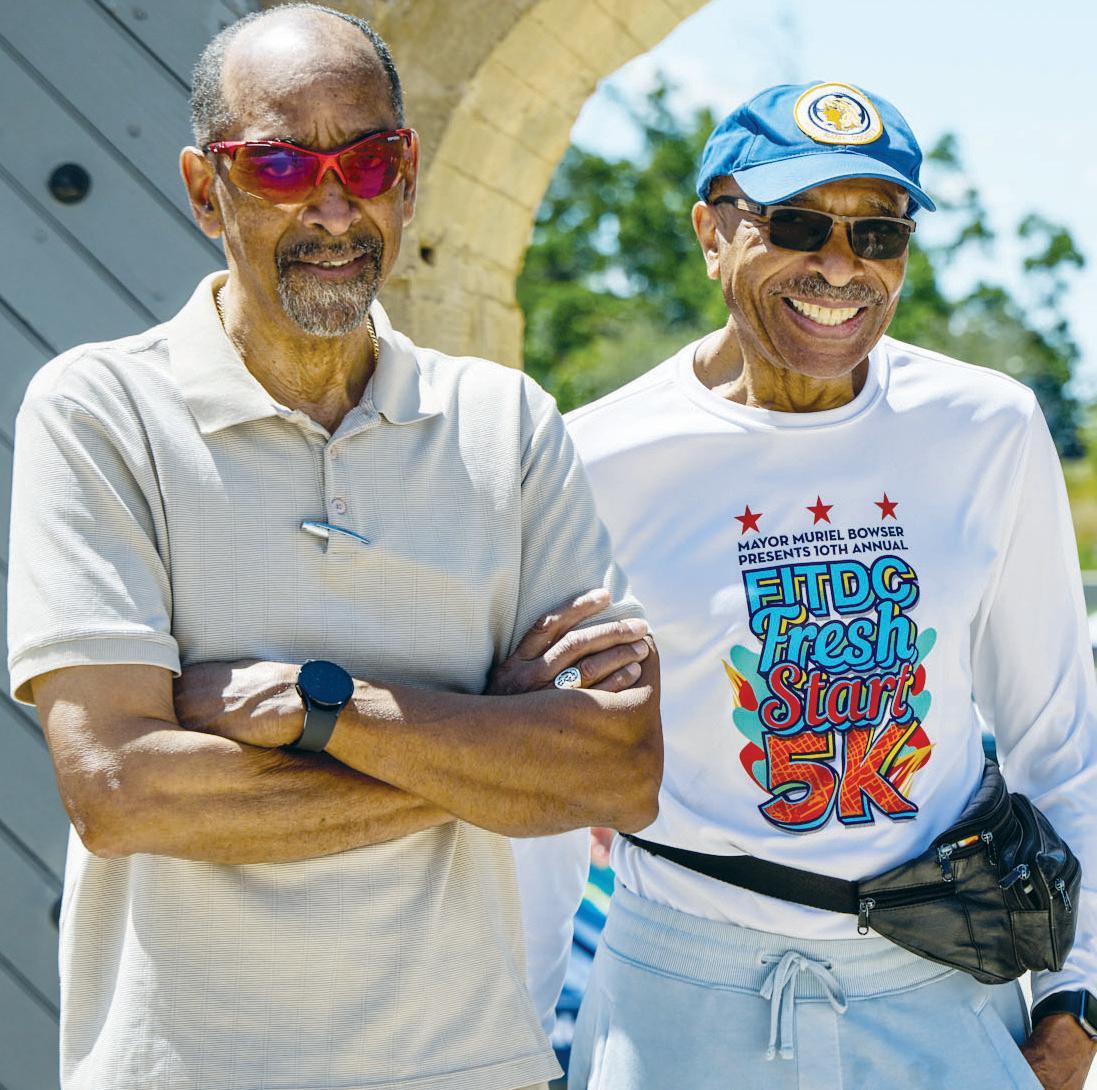 By J. Pamela Stills Special to the AFRO
By J. Pamela Stills Special to the AFRO
On Saturday, June 15, D.C. Mayor Muriel Bowser celebrated the grand opening of the Reservoir Park Recreation Center, located at 2501 First Street N.W. Community leaders who were also in attendance for the celebration included Deputy Mayor for Planning and Economic Development (DMPED) Nina Albert, Director of D.C. Parks and Recreation Thennie Freeman, Ward 5 Council member Zachary Parker and Director of D.C. General Services Delano Hunter.
Mayor Bowser and community leaders led a ribbon cutting ceremony, welcoming community access to the recreation center, an aquatic center and a 6.2 acre park located on the former McMillan Sand Filtration site. Community leaders touted additional improvements the Ward 5 community could look forward to such as a grocery store.
The recreation center houses a multipurpose room with a warming kitchen, fitness studio with lockers and shower facilities, a gallery and an outdoor gathering space that includes two splash pads and an amphitheater. The aquatic area of the center highlights a pool with three-lap lanes and a learn-to-swim area. The park area comprises an immense grass field, a children’s playground, the Olmsted Walk, which encircles the site with adult exercise stations and the restored Memorial Fountain. The center will be managed by D.C. Department of Parks and Recreation and maintained by D.C. Department of General Services. The recreation center will operate Monday through Friday 9 a.m. – 9 p.m. and Saturday 9 a.m. – 5 p.m. The aquatic center will operate Monday through Friday 12 p.m. – 8 p.m. and Saturday 10 a.m. – 5 p.m.


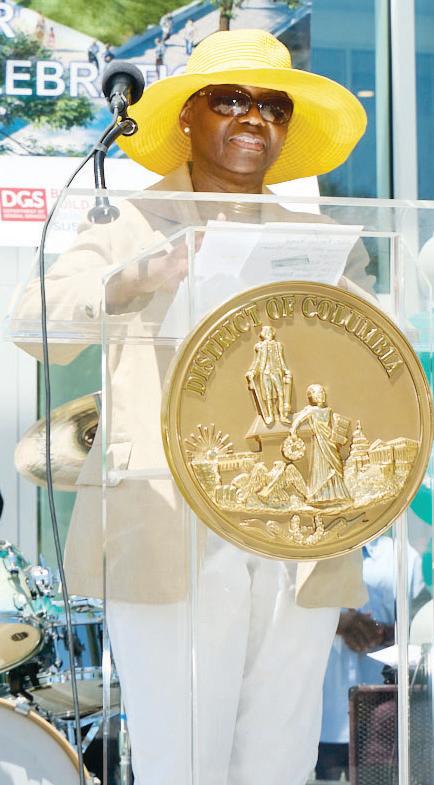
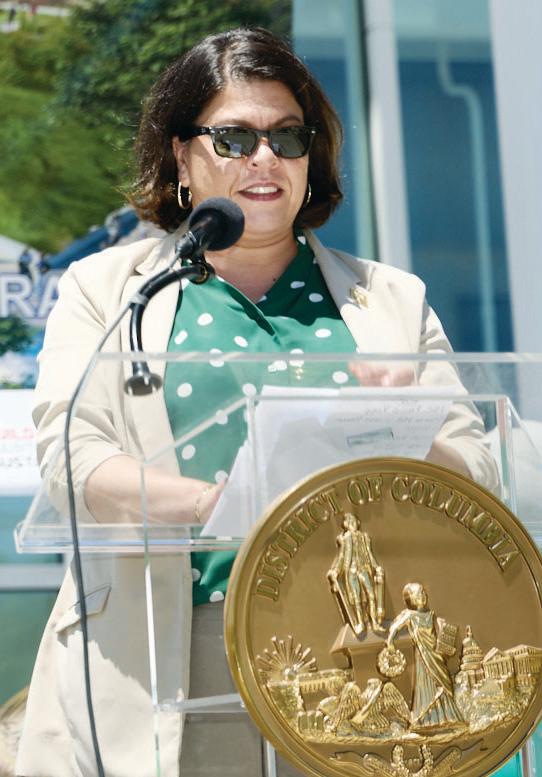
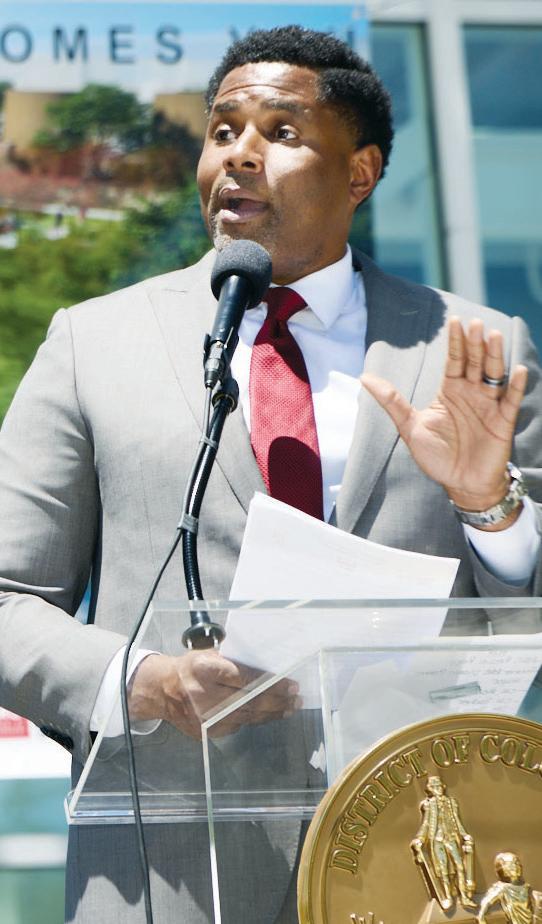
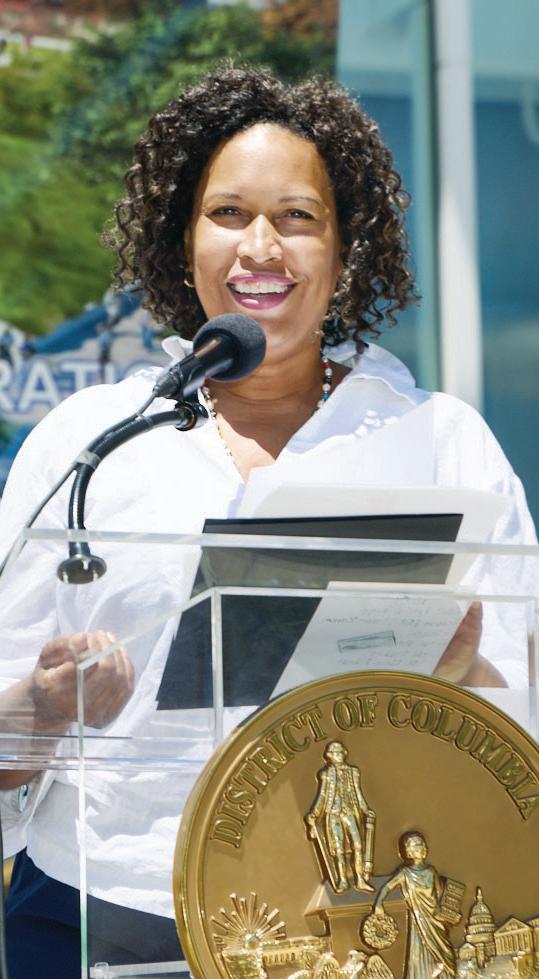
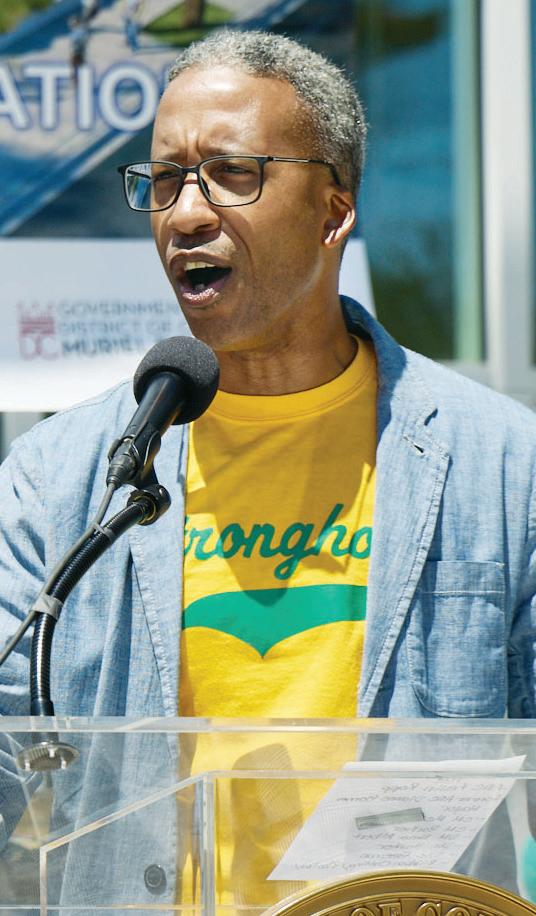
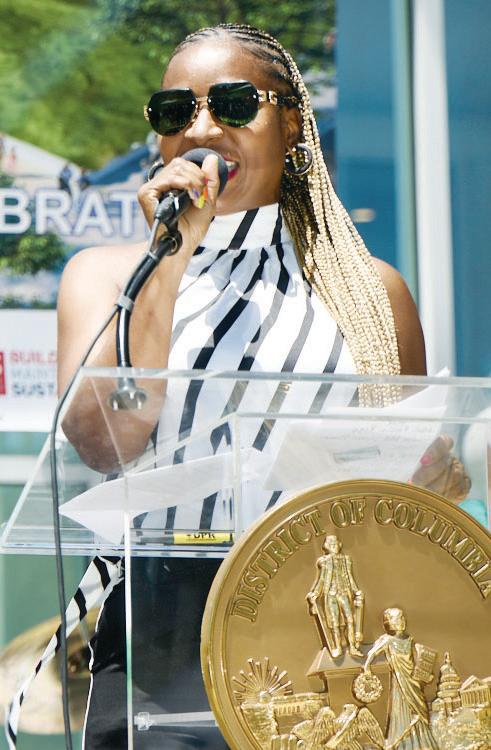
and Recreation,
out the benefits and amenities that are available to all of
